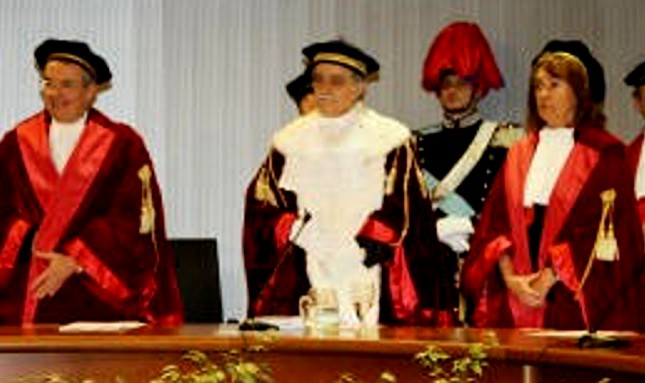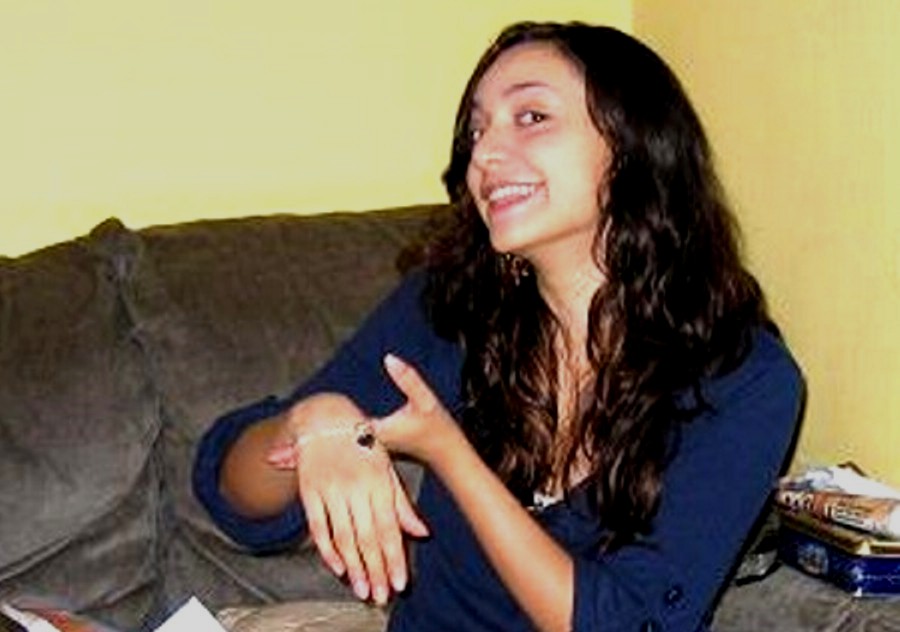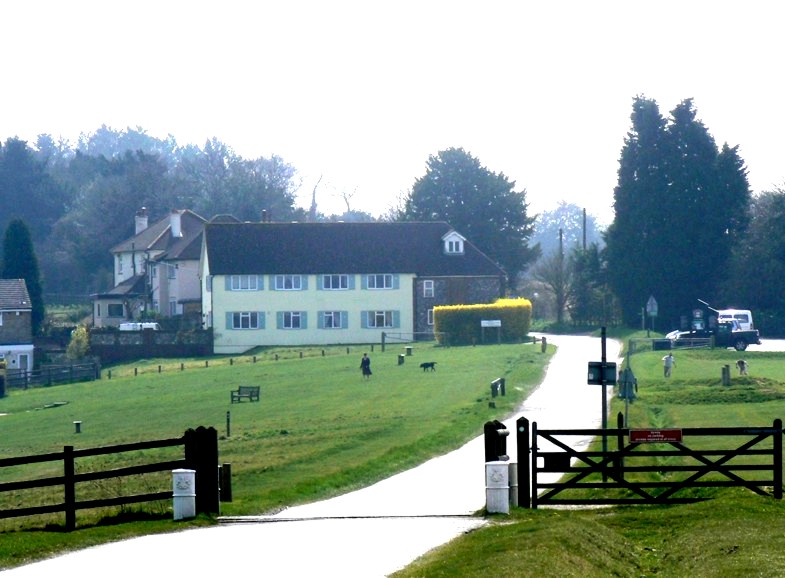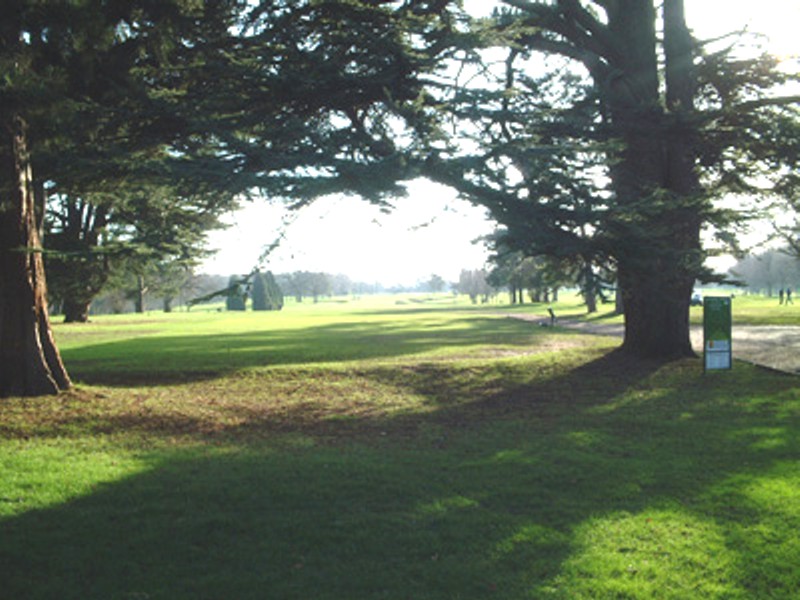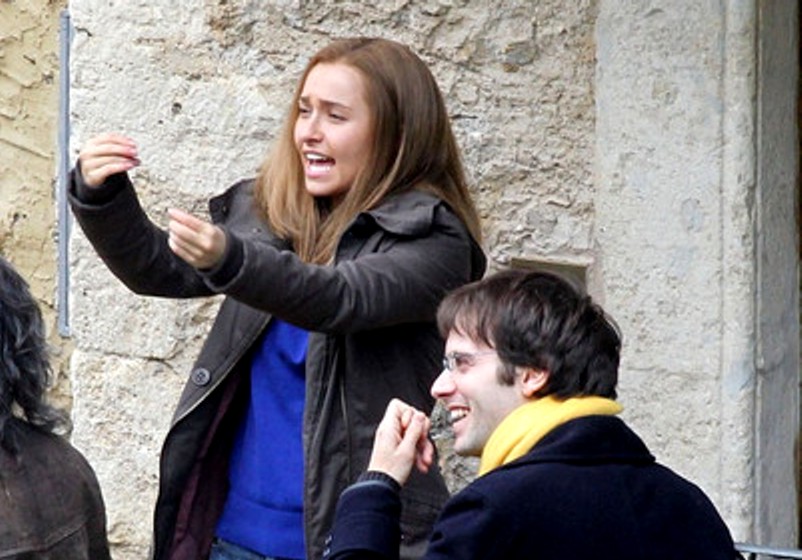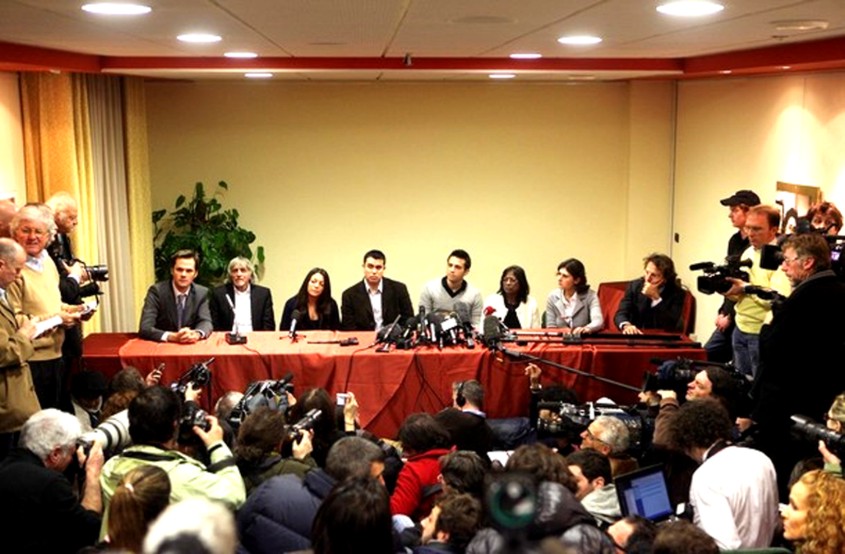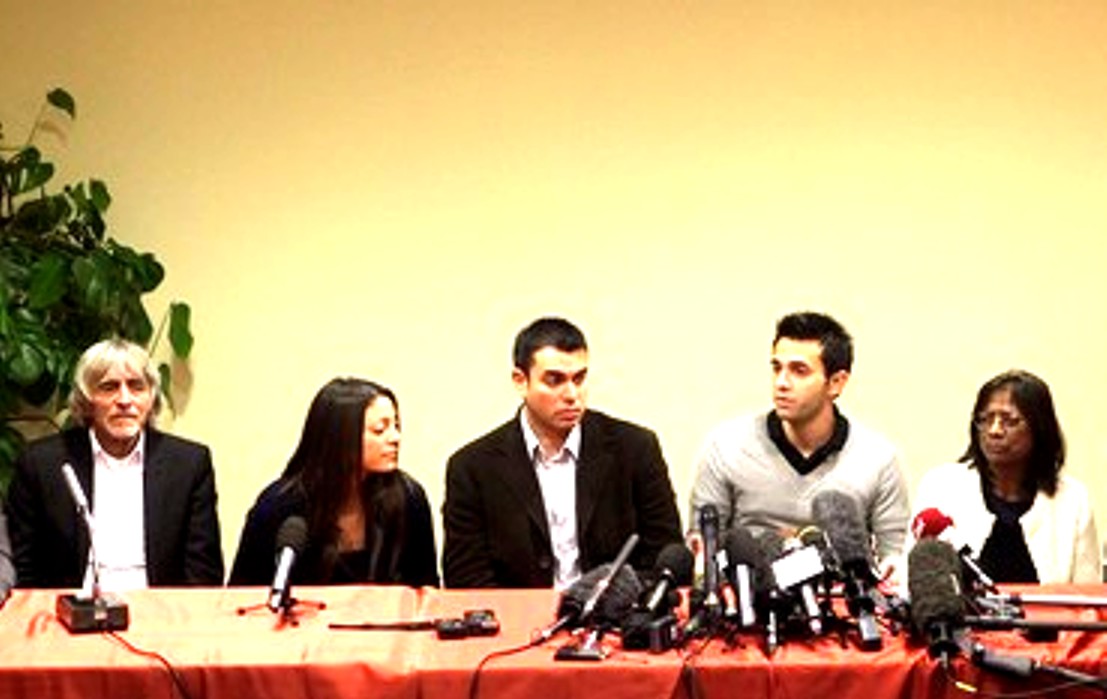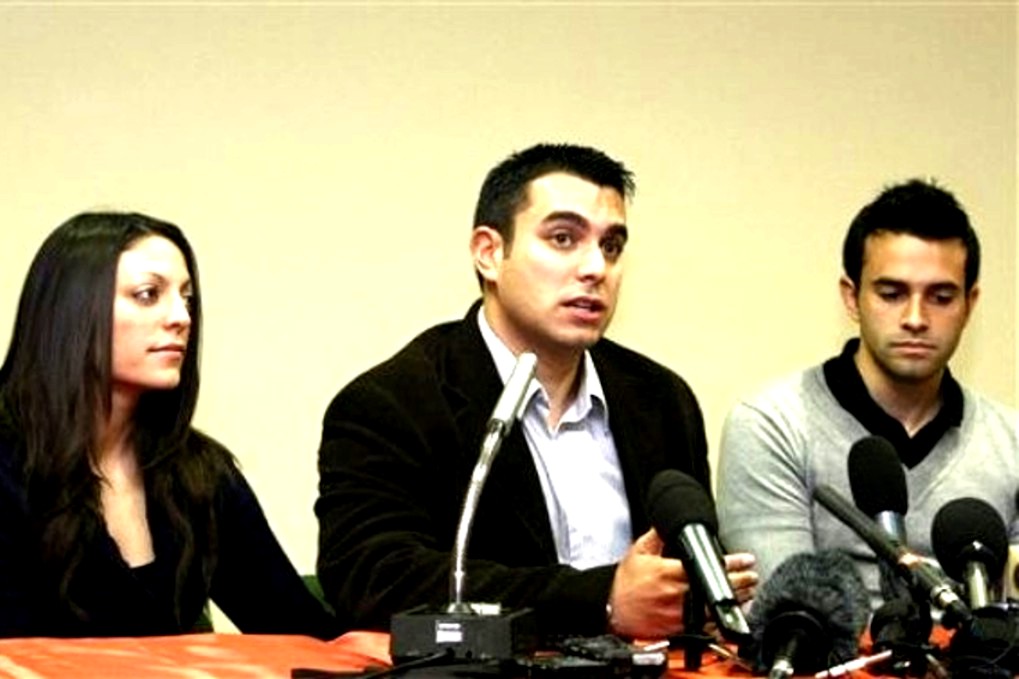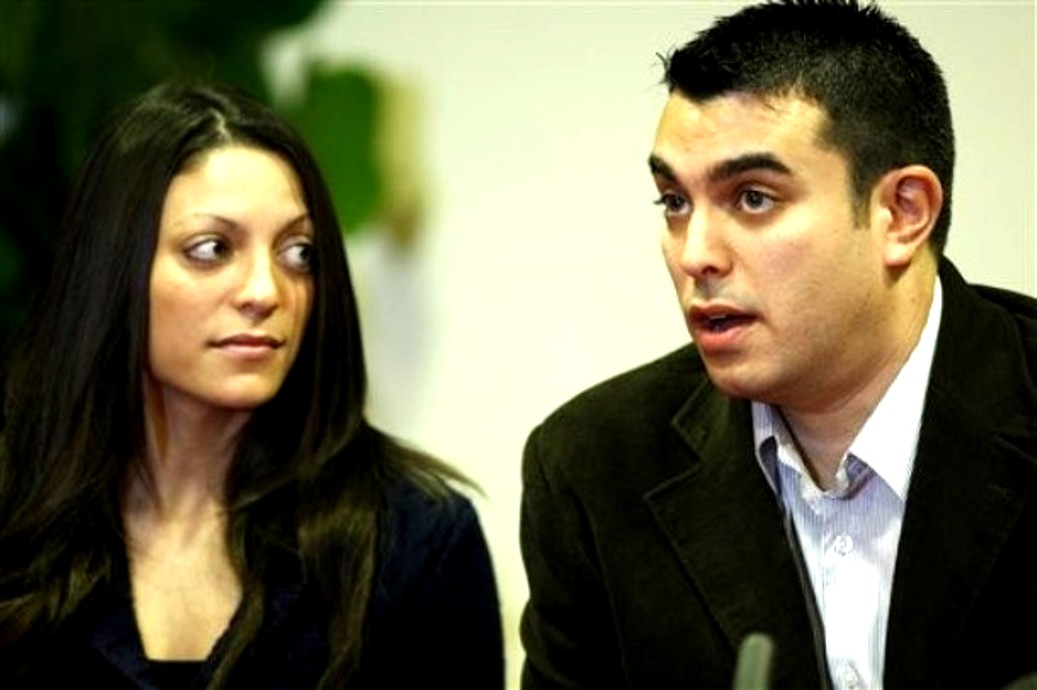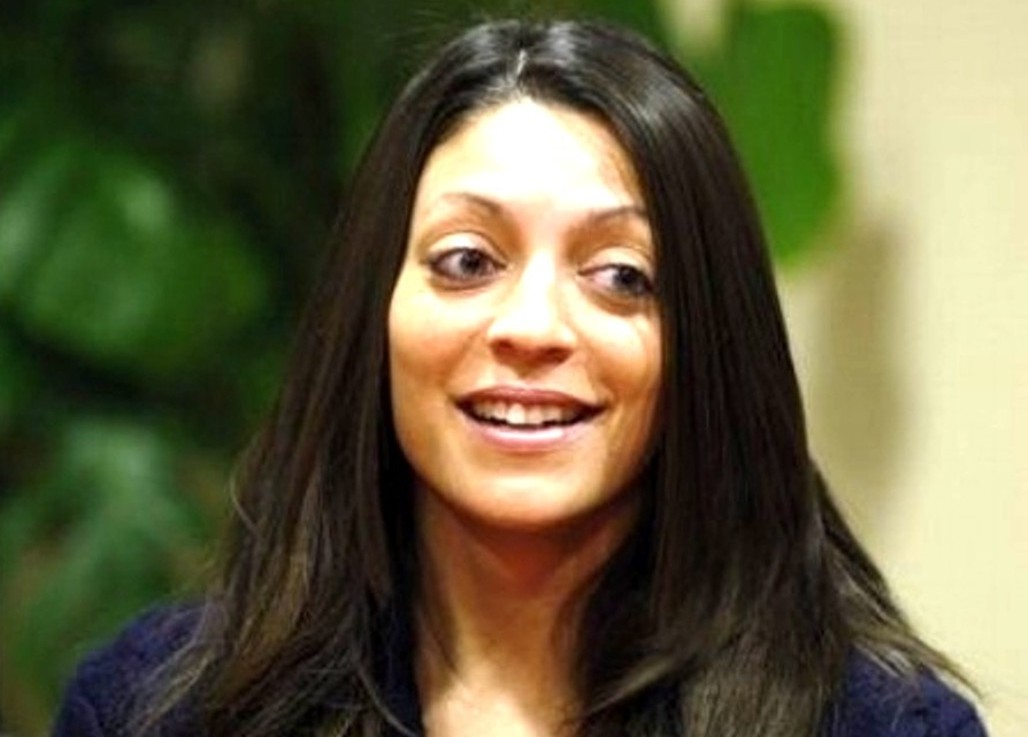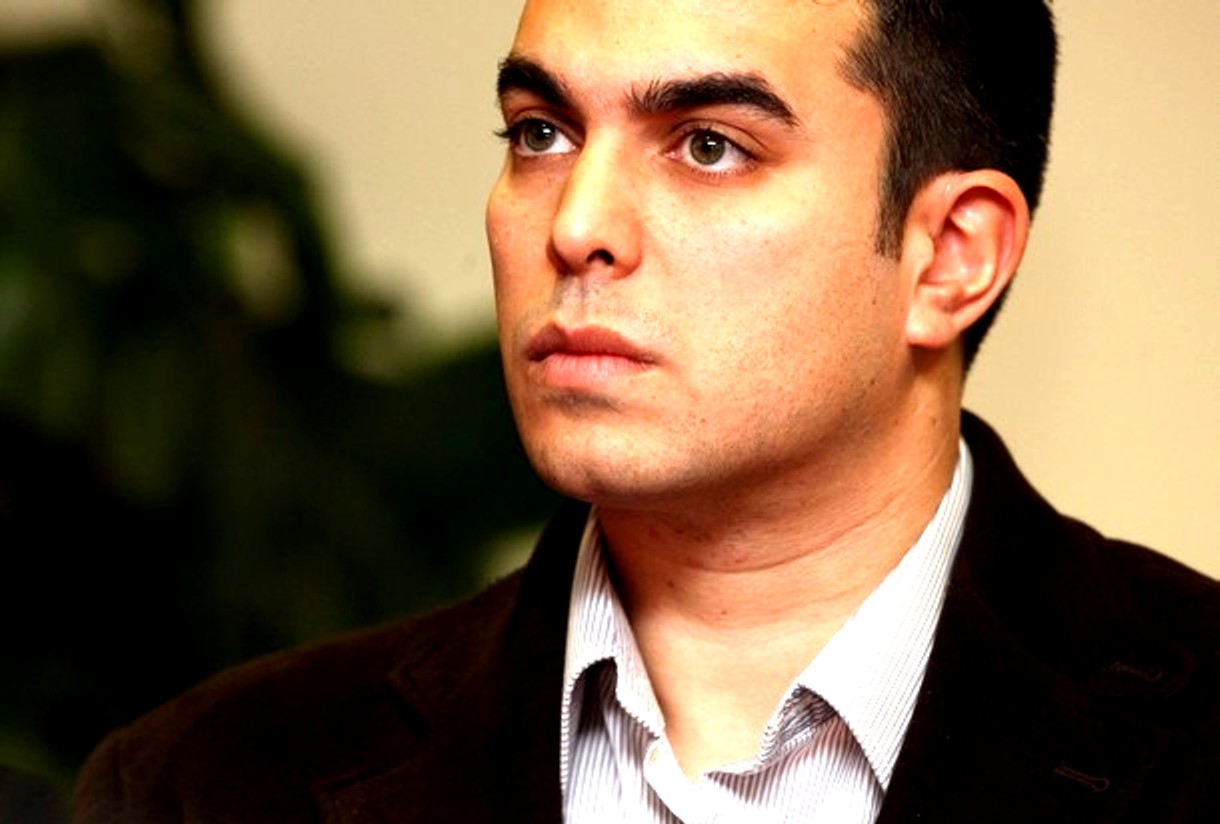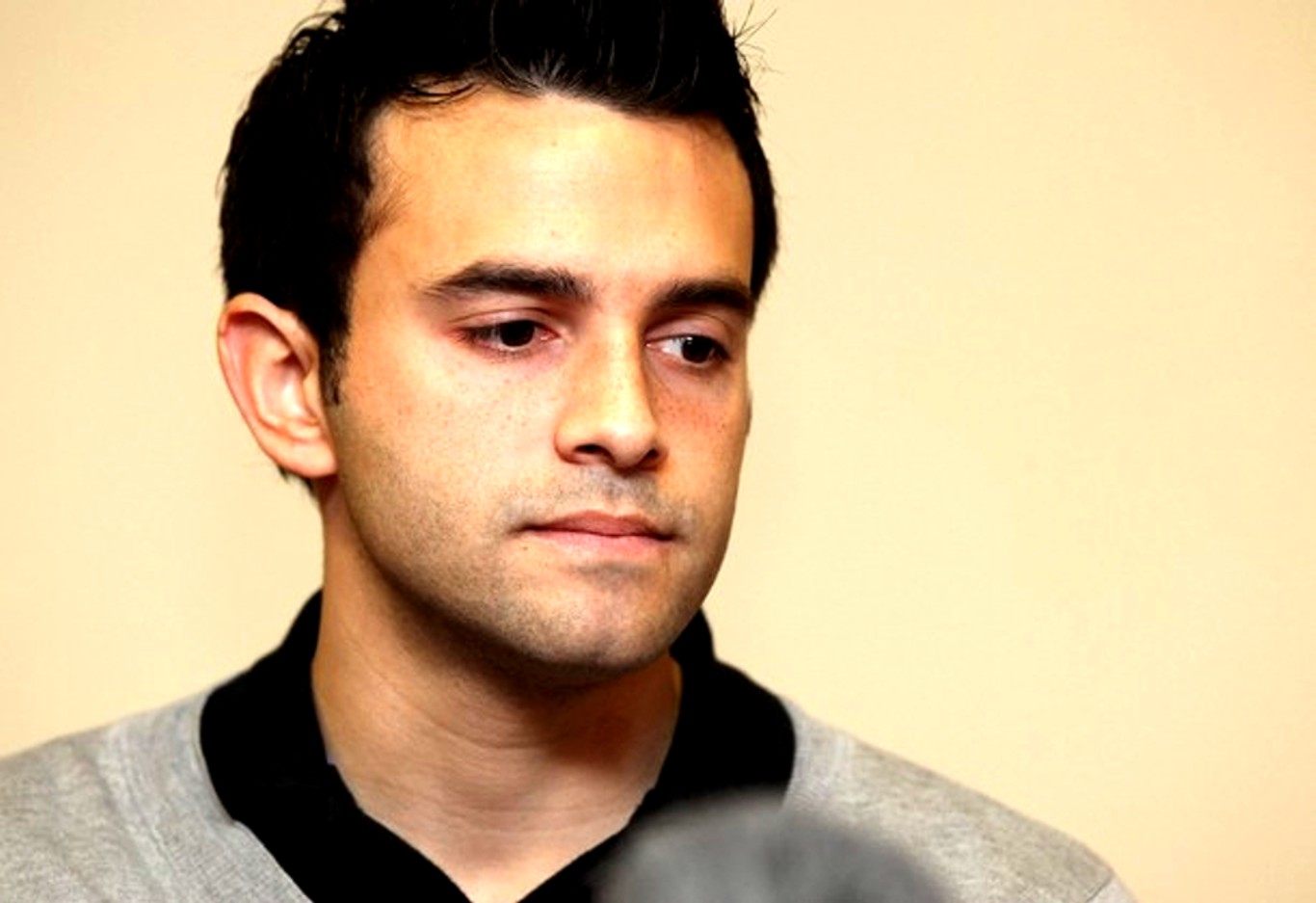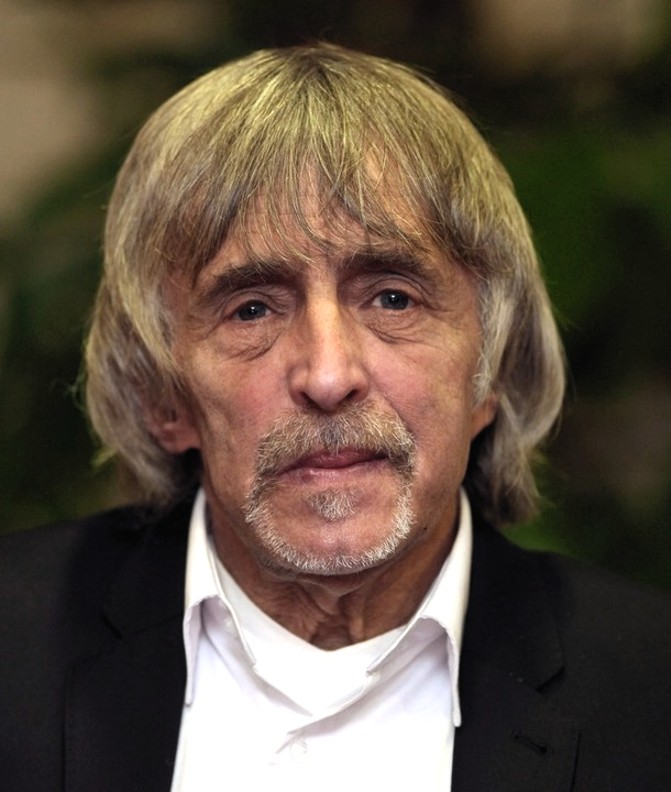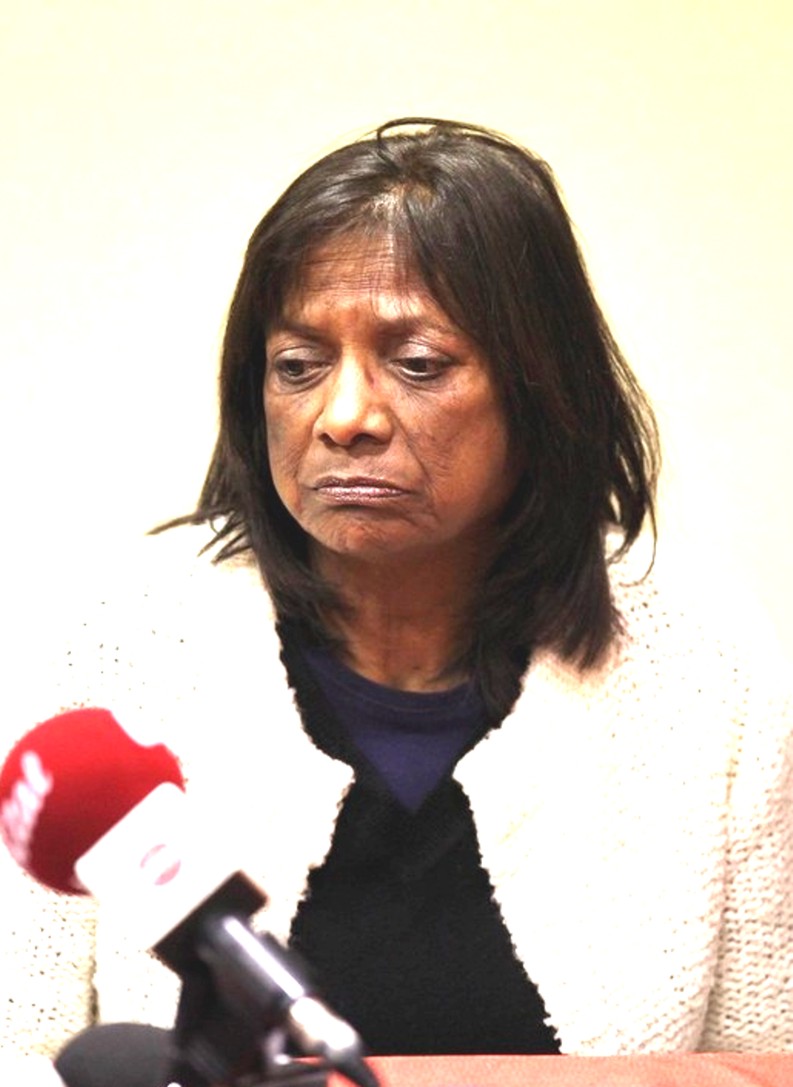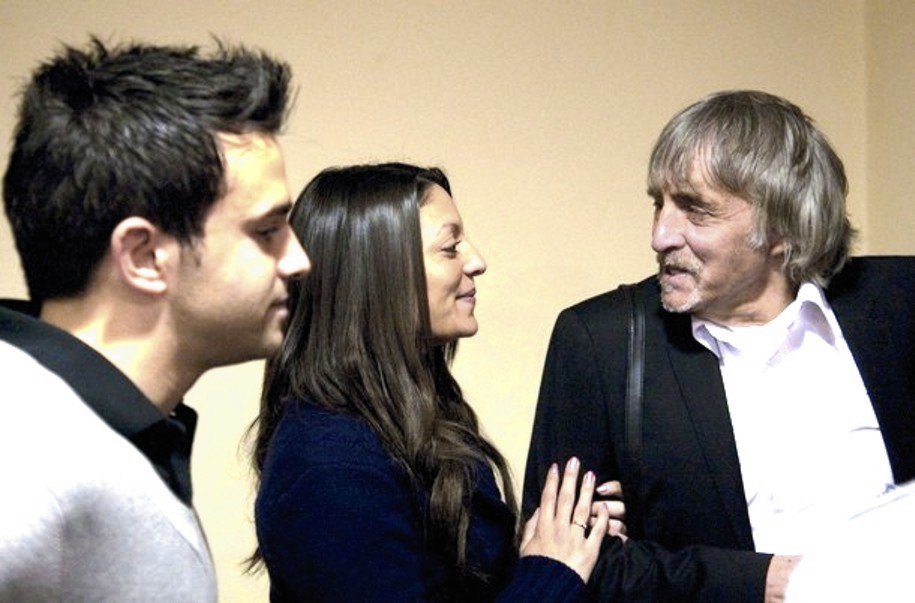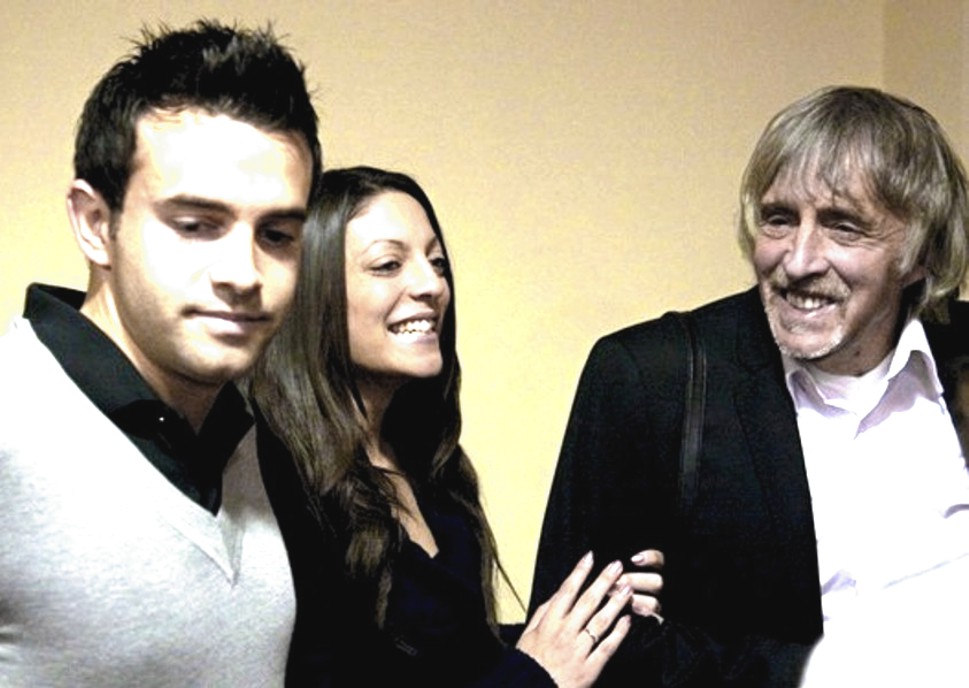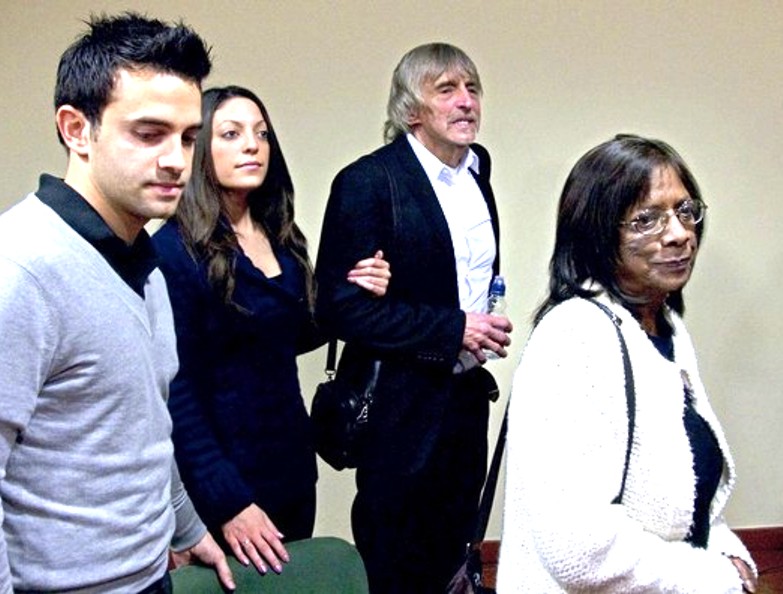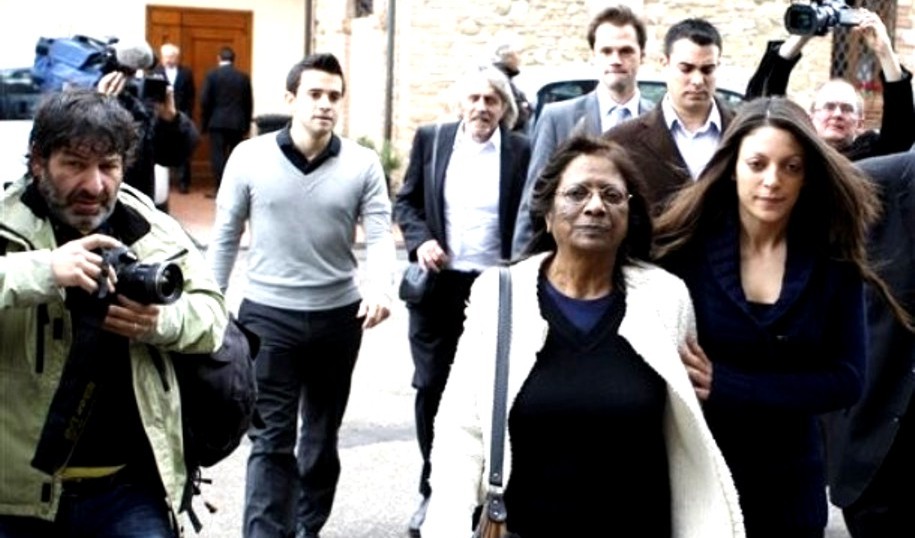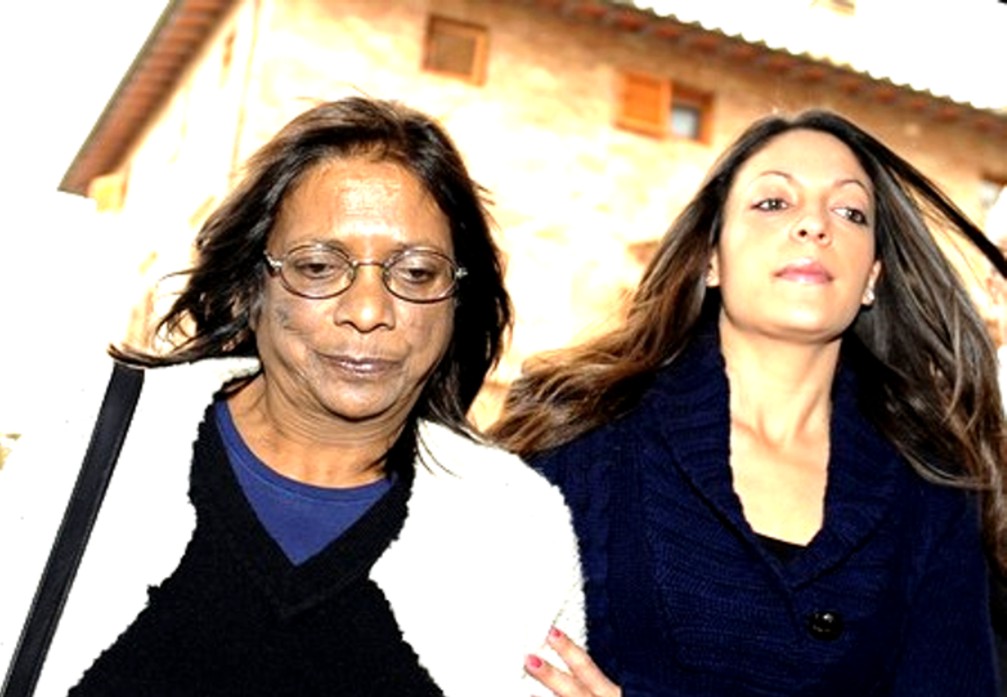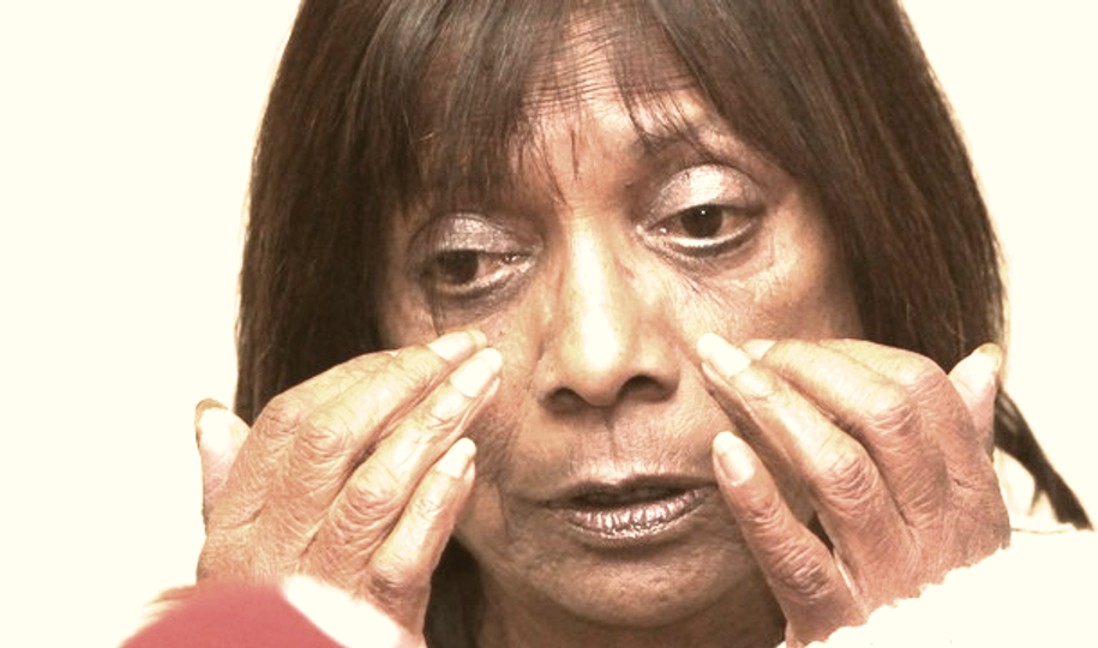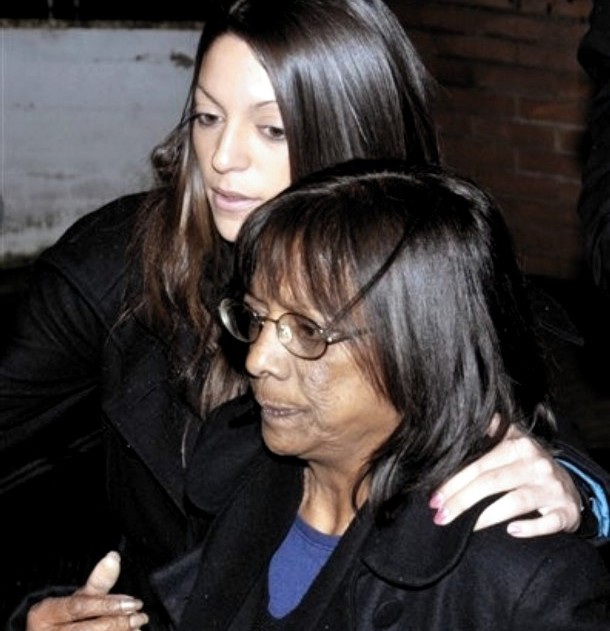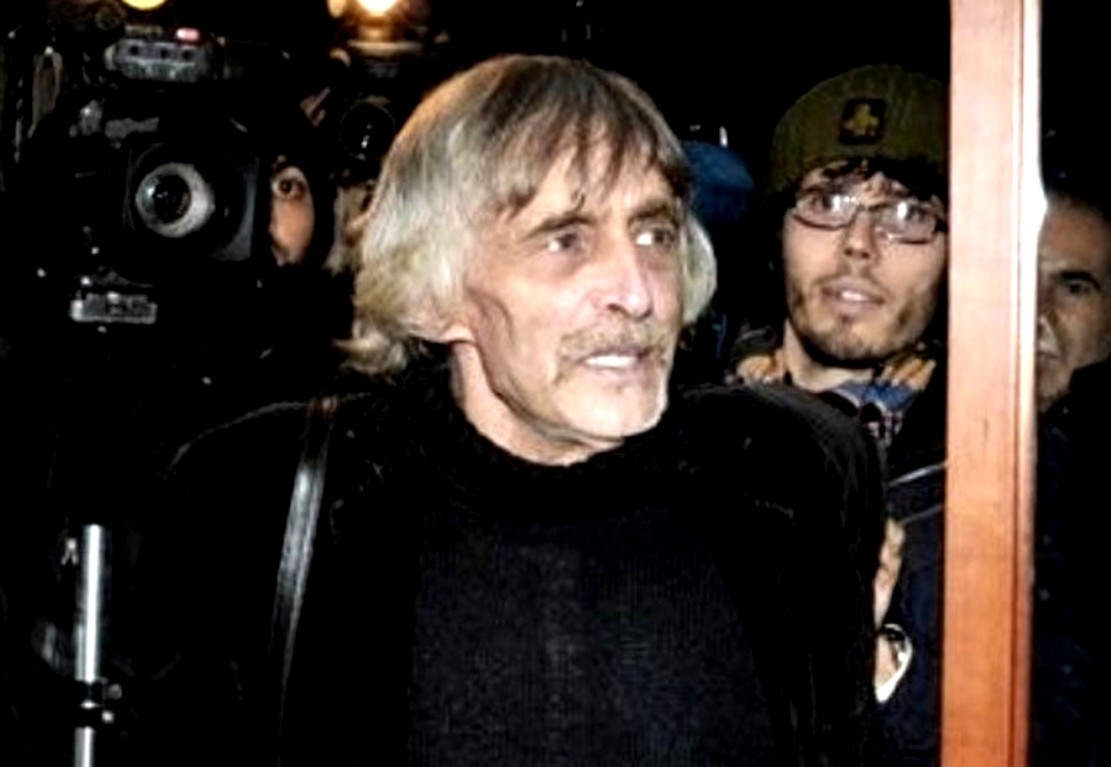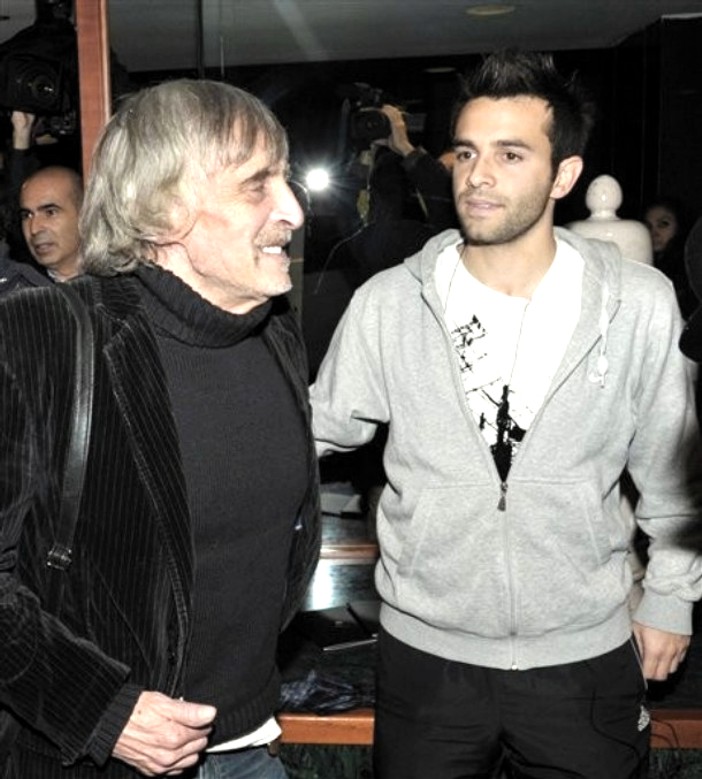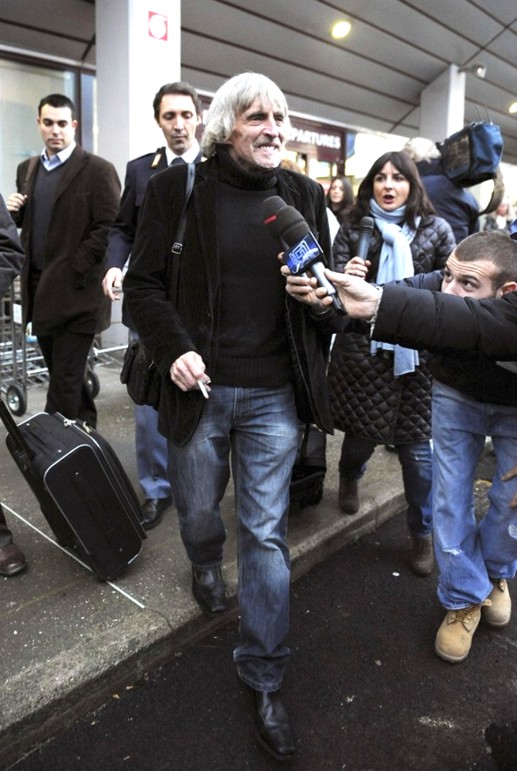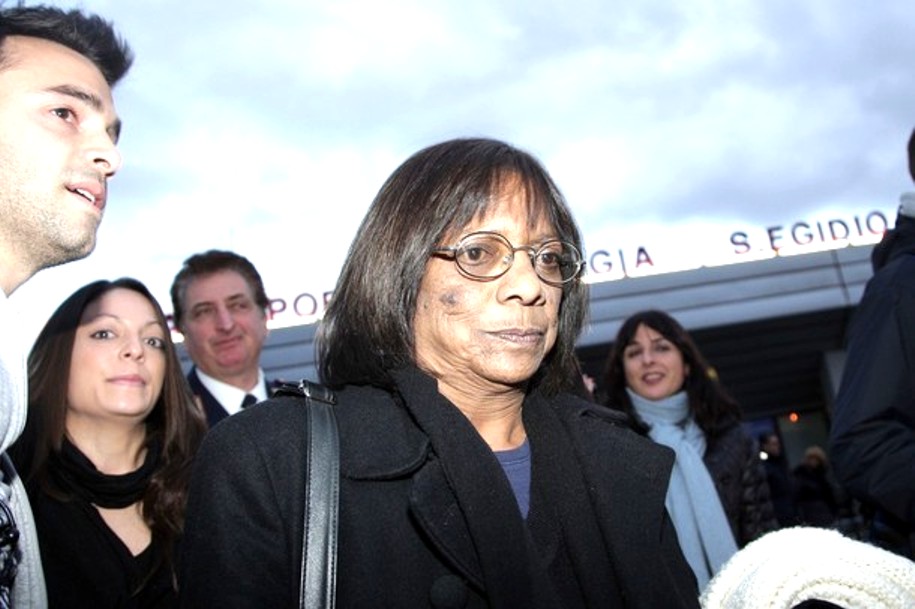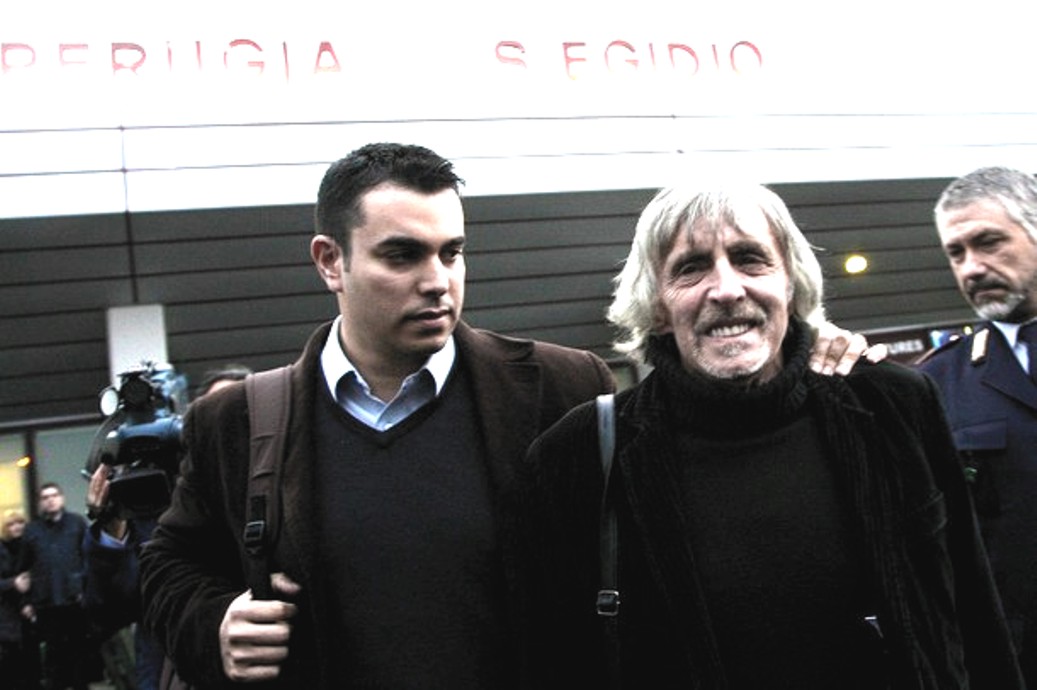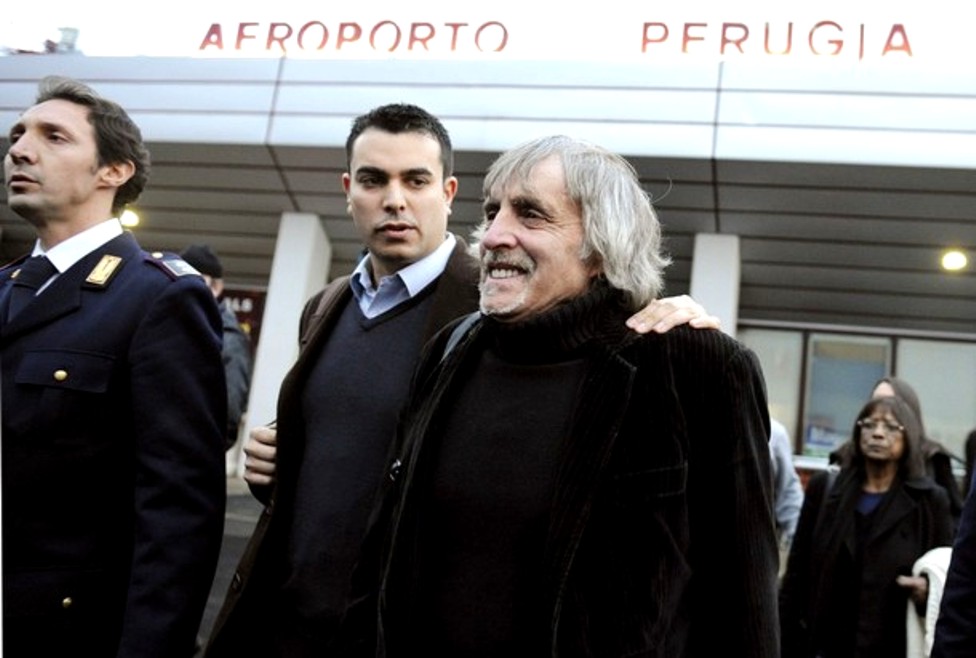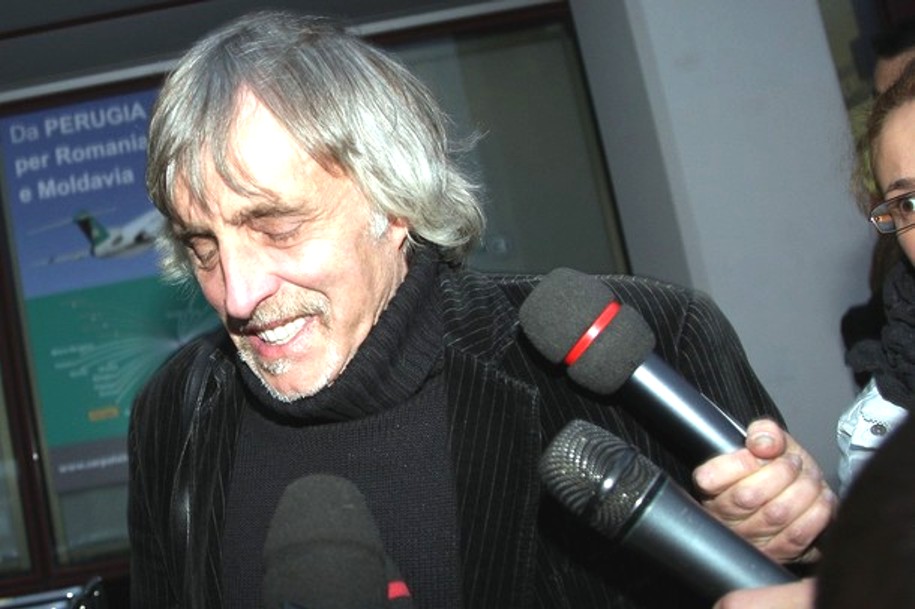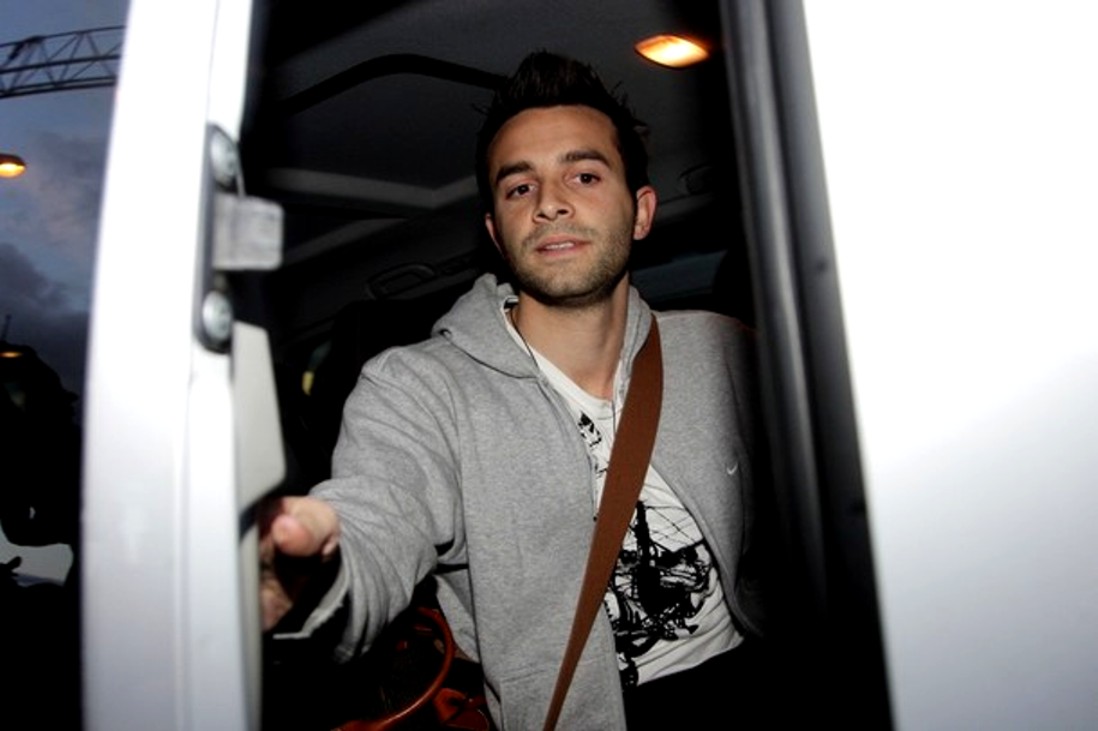
Category: The officially involved
Monday, June 22, 2015
The Real Victim: Will The Cassation Report Promised Thursday Belatedly Suitably Acknowledge Her?
Posted by Slow Jane
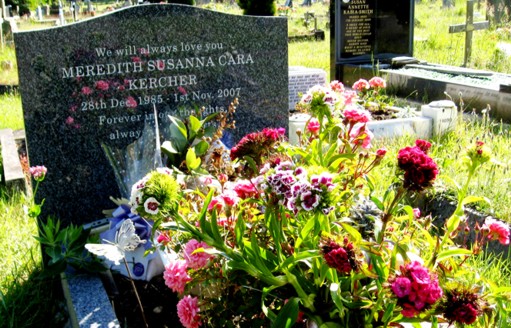
It was a gloriously sunny early summer’s day.
I stepped out of the tube onto Tooting Broadway, with throngs of shoppers overflowing the pavements and schoolchildren milling around the bus stops in groups.
Now here at last, in Croydon Cemetery, fifteen bus stops later, I found Meredith’s grave, startling in its unexpectedness, after walking for quite a while, hopeless at following directions, having originally gone to the wrong graveyard altogether, the day before.
My heart pounded as her name suddenly leapt out at me.
The burial site is beautifully maintained, with miniature pink and red rose bushes and set in the peaceful landscaped grounds, with evergreens and lawns.
I stood for a while overcome with emotion, quite alone, with nobody in sight all around. I said a few prayers, including one pleading that Meredith’s murderers be brought to justice. I quietly sang Psalm 23 and pondered how this beautiful, funny, bright young student had lived a life that was all too short.
A feeling of pain - for her mother Arline and father John, and Stephanie, Lyle and John and for all her family and friends - contracted like a taut elastic band across my chest.
I recalled how at her funeral service at St John the Baptist Church many of the mourners, including sister Stephanie and friends from Leeds Uni had carried a single white rose each.
Stephanie read out a poem she wrote, ” Don’t Say Goodbye”. Her old school friends sang as a choir the requiem, In Paradisum. Two hymns sung at the service, on 14th December 2007, were “˜Abide with me” and “For the Beauty of the Earth”.
Meredith’s favourite record “With or without you” by U2 (below) was played.
As I sat on a creaky bench nearby under the shade of a gnarled old tree, I scribbled down the following lines:
- I came to pay my respects
To Meredith Kercher so dear
To all who knew her.
Go gently into that night
Enforced on you by the evil,
Those who walk in the darkness,
And you were in their path.
Your light shines
And the dark has not overcome it.
I write this article to reflect that this is about Meredith Kercher and her family and friends, and to reclaim the memory of her purity from the soiled agenda of the ex-defendants and the cruel IIP and FOA stalkers.
Stephanie Kercher had said, in response to Knox’s demand, on the launch of her “memoir”, that she be taken to visit Meredith’s grave, that Stephanie and her family just want a safe place for Meredith to rest in peace.
I cast my mind back to the news reports that broke in November 2013 that Raffaele Sollecito had nevertheless paid a “secret visit” to the spot. He had been in London in March 2013. He had the grace not to include pictures of the grave on his “London” Facebook page that he may have taken.
Newspaper reports reveal he was taken there by an “English friend” and left no flowers. The “friend” who was quick to betray Sollecito’s “secret” is speculated to be one Nigel Scott, ex-Lib Dem Councillor in Haringey, and a purported member of the Injustice in Perugia advisory board, the rather grand name of a lobby of aggressive pro-Knox advocates.
Scott put up a picture of the grave in a tweet ““ hastily taken down ““ as the news broke. He disparagingly refers to the grave as being in “poor condition”, with a temporary headstone marker.
His co-campaigner, Karen Pruett, maintains a Find A Grave webpage for Meredith and was forced by demand from enraged supporters of Meredith Kercher’s family to take down the picture of Meredith’s grave, most probably taken from the Daily Mail.
Notorious FOA poster Lyn Duncan - who tweets under the name of @Annella - and others, left “tributes” after the acquittal, despite one of their party, Doug Bremner Jr, having referred to the Kerchers as “Nazis” and another mocking Meredith’s grave lacking a headstone as late as 2011, when Knox was first acquitted by Hellmann, as shown in the Daily Mail.
Time has shown how Scott’s, Pruett’s and other Knox chums’ characters speak for themselves.
Meredith’s final resting place is beautiful, in a quietly understated way. The grave adjacent is of a Liverpool supporter aged 22, who died around about the same time as Mez, who was 21. It is very poignant to see.
Meredith’s headstone is fashioned out of marble and reads, ” We will always love you MEREDITH SUSANNA CARA KERCHER 28th Dec. 1985 ““ 1st Nov. 2007 Forever in our thoughts, always in our hearts.”
The temporary marker, so much derided by Knox’ supporters, remains at the foot. I left some Sweet Williams in a flower container and slowly walked away, moved and changed by the visit.
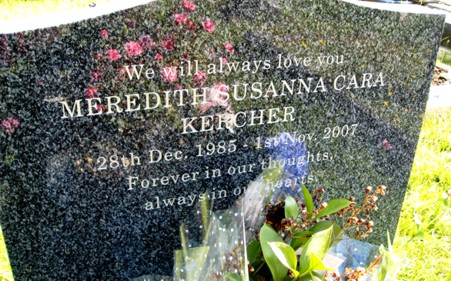
Saturday, October 26, 2013
John Kercher’s Excellent Book “Meredith” On Meredith’s Employer And Her Circle Of Friends
Posted by Hopeful

Robyn Butterworth who had also been at Leeds University with Meredith, went to Perugia and roomed with Amy Frost. Often Meredith would go to their flat for lunch. She “often brought a kebab with her, which we found amusing; she loved them.”
(p. 77) “Occasionally, we would go to see a British film at the cinema, and the one in Perugia was like an old theatre, a lovely place.” Robyn Butterworth was in some of the same Perugia University classes with Meredith.
Only a few days before her death, Robyn said that “Meredith had been talking to me during our evening phone call about a university trip to Turin, and we discussed the possibility that she might be able to see the famous Turin Shroud. Unfortunately, she discovered that the trip was fully booked, and so she was hoping to get on the next one. Meanwhile, I was urging her to go to Venice…”
(p. 78) On the first night Robyn met Meredith in Perugia, she and Meredith and Amy who already knew Meredith went out for pizza. Robyn said, “I instantly warmed to Meredith and she was really amusing…She and Amy were the witty ones….In the evenings we would sometimes go to the Merlin Bar in Via del Forno, a place which was a cross between a pizzeria and a bar.”
“Pasquale Alessi, a co-owner of Merlin’s, has said: ‘Meredith was a really nice girl. She liked to go out with her friends. But I never saw her with any problems; never saw her drunk. She always liked to go out with Sophie and Robyn, but she would watch out for them.
“She was the careful one. ‘Now we have to go home,’ she would say, ‘as we have to get up tomorrow and go to class.’”
(p.78) Sophie recalled going to the main street cafes to have a coffee or chocolate with Meredith. “Meredith loved her chocolate,” Sophie said. “There was also a kind of refectory at the University for Foreigners where you could get cheap lunches.”
Mr. Kercher begins Chapter 4 of his book with the heading “The Investigation”. He outlines how difficult it was due to the language barrier and the far distance in England to get news of what was really happening in Perugia.
Their lawyer Maresca spoke on the phone to Stephanie Kercher who understood Italian, or the family had to talk to him using his interpreter. (p.81) We were also getting fragmented details on the Internet of events as they unfolded, but these were difficult to trust and we did not know where the truth lay. At this stage, most of the web information we could find came through translations of the Italian media, particularly the newspaper “La Repubblica”.
(p. 82) “How had Meredith died? How had she been discovered? Who was responsible?” These were the questions that our family was debating. Though we lived apart, we spoke to each other every day, if not to keep abreast of new developments, then only so that we could share our utter disbelief that this had happened. At this stage, we didn’t realize that Meredith’s housemate Amanda Knox and her boyfriend were becoming the police’s prime suspects. All we could think of was, who would have done this terrible crime and why? Meredith was the last person in the world that anyone would want to harm. Everyone loved her.”
...“Perugia…had not seen a killing for more than twenty years,” so the small town of Perugia was equally in shock.
(p.88) Sophie Purton and Robyn got a call from the police and were told to meet the police at the university. In the early confusion and aftermath of finding Meredith’s body, the police were saying the murdered girl was Welsh. Sophie, Amy, and Robyn then were driven to the police station in a plain police car. “We still didn’t know where we were going and still didn’t know what had happened to Meredith. This was about 6 o’clock in the evening. When we arrived at the police station we were put into a waiting room. That was Robyn, Sophie, and me (Amy). Then Meredith’s housemate, Laura, walked in. She was crying.” They then realized it was their friend Meredith Kercher who had been murdered.
Monica Napoleone (p.89) testified of Amanda’s behavior at the police station, ‘Amanda had complained that she was feeling tired…I told her that she could go if she wanted to, but she said that she wanted to stay and wait for Raffaele. A few minutes later, I walked past a room…and I saw Amanda doing the splits and a cartwheel.’
Monica Napoleone continued, ‘She and Sollecito had had a bizarre attitude throughout the whole time. They seemed completely indifferent to everything. They were lying down, laughing, kissing, pulling faces at each other, and writing notes to each other. They were talking to each other in low voices for the whole time. It was impossible that they were behaving like this when a dead body was in Amanda’s house.” (p.89)
(p.90) Robyn said, “I remember how Amanda kept going on about how she had found the body. It was as if she was proud to have been the one who found it….When I went into the waiting room, Amanda was talking at the top of her voice in English to everyone there.”
Later (p.92) Mr. Kercher describes how Amanda changed her stories and kept embellishing them with Patrick being the culprit and herself cowering in the kitchen. She said, “I coud hear Meredith screaming” in her written statement to police.
Amanda also said (p.92) about this scenario of her with ears covered in the kitchen: “These things seem unreal to me, like a dream. The truth is that I am unaware of the truth.” Then she goes on to say that she didn’t kill Meredith and adds, “In these flashbacks I’m having, I see Patrick as the murderer, but I do not remember for sure if I was at my house that night.”
The police then arrested Patrick Lumumba.
(p. 93) “Back in England, this was the first big piece of news we had heard concerning the investigation…Pictures of Lumumba were being shown on television, and at our separate family homes we looked on in disbelief, not knowing whether to believe that we were seeing images of the man who killed our daughter. I spoke with Arline on the phone and neither of us could believe that we were looking at the killer. He did not look like a violent man…had short hair, ...a slightly plump face. I have never before had to question if I was looking into the eyes of a killer, and it struck me how normal he looked. He appeared to look confused when we saw film footage….I felt anger. ...Was this really the man who had taken Meredith’s life away?”
(p. 94) Lumumba told police he had never been to the house where Meredith lived. “I only saw Meredith about four times…” he said. “I had told her to come to the bar on the Friday where we could make her special mojitos”. It seems Meredith had spoken about making mojitos for the bar owner in an evening phone call to her dad. She had some bar experience and Mr. Kercher says “she could make wonderful mojitos. In fact, she knew how to make about twenty different cocktails.”
Lumumba pled with police that he was not the killer, that “It’s not true what Amanda says, that I wanted to be with (Meredith).... I shut the bar… I went home.”
“Suspicious of the conflicting stories being told to them by Sollecito and Knox, requests for their arrests…were made. Until this point, Knox and Sollecito had been regarded as ‘witnesses’....Five days after the horrific killing, Judge Claudia Matteini granted the request for their arrests…” (although they were not yet officially charged with murder but held as flight risks, while Lumumba was already being held.
The Kerchers were now being made aware that not only had Meredith been killed, but subjected to a sexual assault. (p.95) “It felt as if, with every news report or detail that was coming out of Italy, things were becoming more and more terrible. That Meredith was gone was tragedy enough…”
Two weeks later Lumumba was released by Mignini for lack of evidence. Lumumba said, (p. 97) “I believe that Ms Knox had the idea of implicating me when we had met outside the University for Foreigners…. I had been discussing with one of the university teachers whether I woud be a suitable person to act as a translator for reporters from Britain, who did not speak Italian. At this moment, I saw Amanda arriving and I asked her if she liked the idea. She said, “No” and went off smiling. Perhaps that was the moment when she decided to land me in it.”
(p. 97) “I think that Amanda wanted to derail the investigation. That’s what I think, ” said Lumumba. “she must have realised that the investigation was leading to her and thoguht that, if she mentioned me, then the investigators’ attention would shift to me.”
“I can tell you that she wants to be the centre of attention. I think that she is a person capable of doing anything to be in the spotlight.”
Lumumba said, “Amanda hated Meredith because people loved her more than Amanda. She was insanely jealous that Meredith was taking over her position as Queen Bee.” (p. 98)
(p. 99) The Kerchers begin to learn about Amanda Knox’s “double life”. Clint Van Zandt, who had been a long-serving employee of the FBI’s Behavioral Science Unit, told NBC News’s Dennis Murphy: ‘Realise that this is a woman wearing two masks. One mask is Amanda the good girl, in a Catholic school, an athlete, does what her mother says. And then you’ve got the other mask that, when she gets to Italy, it’s “I’m going wild. I’m having fun. This is where i sow my wild oats.”
(p. 100) The double life of Raffaele Sollecito begins to reveal itself. Not only is he the quiet bespectacled student with a privileged background and prominent family with medical doctor father, but he describes himself as “sweet but sometimes absolutely crazy” on social networking sites, and posts photos of himself holding a meat cleaver. Police later find a collection of Japanese manga comics, some of which depicted acts of extreme violence. “One, which attracted particular attention, was concerned with the killing of female vampires on Halloween. It was not lost on police that Meredith had been dressed as a vampire to celebrate Halloween only one night before she was murdered, and they later went on to say that the scene they discovered at the cottage was reminiscent of the scenes depicted in Sollecito’s comics. Upon learning this, we could not help but wonder if Meredith’s murder had been premeditated….”
(p. 102) The Kerchers learn of a fourth suspect, Rudy Hermann Guede. He had arrived in Italy from the Ivory Coast in 1992 at age 5. His father had left him alone in Italy and returned to Africa when Rudy was 15. Mr. Kercher quotes the wealthy Italian, Paolo Caporali, who had taken Rudy in like an adopted son and tried to help him for years. “I thought that I could help him build a future, but I realised that I had made a mistake. He was a tremendous liar…”
Rudy fled toward Mainz, Germany when police detained him and extradited him back to Italy. It seems Rudy’s German stay along with Amanda’s German visit and Raffaele’s time in Germany as student were all scenes of foolishness and curtailed.
” All these events had been unfolding as we waited in England for the return of Meredith’s body.” (p. 107)
Monday, April 15, 2013
Barbie Nadeau Interviews Meredith’s Mother On Her Continuing Hope For The Full Truth
Posted by Our Main Posters

From Barbie Nadeau’s interview with Arline by phone in the Daily Beast.
“It is always distressing to hear and read about the murder,” Arline told me by phone from England, where she lives. “We have to brace ourselves for another round of this nightmare.”
And yet, while at some level she is dreading the revival of the spectacle surrounding the case, she is also glad the pursuit of the truth is continuing. “We want justice for Meredith,” she told me. “We don’t want anyone who is innocent to go to jail, but there are still a lot of unanswered questions that seem to have been ignored in the last trial.”
Arline is invariably stoic, patient, and nice. But the outcome of the annulled appeal in 2011 which we now know was bent was a tremendous shock.
[After the 2009 trial Arline] Kercher went back to London to begin that painful journey. But that process was disrupted when Knox and Sollecito’s convictions were overturned on October 3, 2011. Kercher was back in the courtroom again that night. When the not-guilty verdicts were read, tears streamed down her face.
Now Kercher will have to wait once more. There will be at least two more verdicts before the nightmare is over””one by a new appellate court, which will reconsider the case, and another by Italy’s high court, which must sign off on the appellate court decision, or send it back to trial once again. As the next chapter of the case unfolds, she will have to relive the media show that tends to focus on Knox as the main character and her daughter as a bit player. She will again hear the gruesome details of her daughter’s horrible death. She doesn’t know how she will handle another cycle of trials, or if she will attend the next one.
The unfeeling Judge Hellmann spread the anulled appeal over a full year in 2011 with sessions only about every second Saturday to suit defense lawyer Giulia Bongiorno and her baby.
He did not give a second thought to the immense travel and cost difficulties of the Kerchers. The new appeal could and should fit in a space of two weeks. Chief decider once Cassation sets the ground rules (due in writing any time in the next few weeks) will be Fabio Massimo Drago.
Dr Drago (at center below) is Tuscany’s chief judge.
Monday, March 25, 2013
After Bizarre Hellmann Outcome Hard Questions That Meredith’s Family Now Face
Posted by Peter Quennell
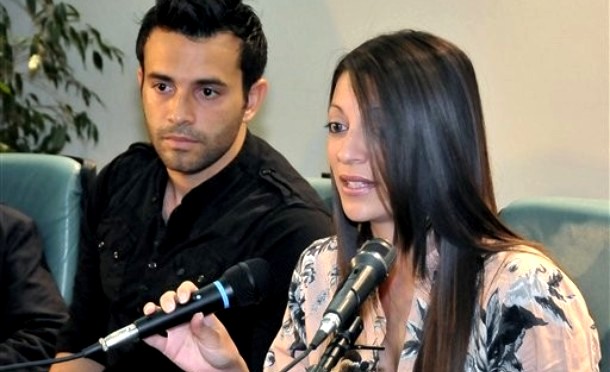
[Above: Stepahnie Kercher at end of first appeal in late 2011 with Meredith’s second brother Lyle]
Judge Massei came out with a clear scenario for Meredith’s death after trial in 2009.
Judge Hellmann attempted to pick it apart but left no sensible scenario in its place. That is the toughest and legally most crucial argument of today’s prosecution appeal: that the 2011 appeal judges attempted to run a whole new trial - but essentially only listened to the defense.
In this context as Tom Kington reports the Kercher family lawyer in Perugia Dr Francesco Maresca has made this series of comments:
Francesco Maresca, a lawyer representing the Kerchers, claimed the acquittals of Miss Knox and Mr Sollecito were “defective” and “lacked transparency”, adding he was pushing for a retrial.
The appeal court rejected key evidence against Miss Knox and Mr Sollecito after ordering new expert analysis of traces of DNA found on a knife belonging to Mr Sollecito, and on Miss Kercher’s bra strap.
“There are many parts of the judge’s ruling that are defective,” said Mr Maresca. “For example, why did they only review those two bits of evidence? What about the blood in Miss Kercher’s bathroom and traces in the rest of the house?”
Mr Maresca also suggested the appeal court judge had buckled under pressure from supporters of Miss Knox in the US.
“There was a lot of external pressure and the judge showed a will from the start to acquit,” he said.
Dr Maresca also passes on a statement from Meredith’s sister Stephanie:
“We all still miss Meredith terribly… Unfortunately nothing will bring her back.” Miss Kercher said her family continued to receive support from around the world and had set up a Meredith Kercher Fund to help pay their legal fees, adding the fund could be turned into a charity foundation when the case concludes in Italy.
“A beautiful young girl, my little sister, was taken from us far too soon in such a brutal way with too many unexplained factors,” she said.
Wednesday, October 31, 2012
UK Cosmpolitan Magazine Rightly Names Stephanie Kercher As A Woman Of The Year
Posted by Our Main Posters

We posted Stephanie’s Open Letter about herself and Meredith back in November 2011.
This much deserved award is widely reported in the UK. Good interview by Rosie Mullender in Cosmopolitan and she indicates that another longer one is to come.
When we met near our offices, I was nervous ““ Meredith’s death would obviously be a devastating subject to talk about, and I wasn’t sure how Stephanie would deal with being asked about what happened.
But as soon as I met her, I relaxed. Stephanie is warm, open and friendly, and her face lights up every time she talks about her sister. As she told me all the wonderful things she remembered about Meredith ““ her smile, her laugh, the way she’d help anyone with anything ““ she couldn’t help laughing herself.
And good photos and another report in the Daily Mail.
Celebrating the ‘resilience and strength’ she has shown in supporting her family, the 29-year-old will receive the Ultimate Editor’s Choice accolade at the event, which celebrates the year’s most inspirational figures.
Cosmopolitan editor Louise Court said: ‘Since the death of her sister, Meredith, five years ago, Stephanie remains an inspiring figure of strength and support…
‘Most impressive of all is her single-minded desire to ensure her sister isn’t forgotten and to make sure her personality shines through any projects she undertakes…
‘A devoted daughter and sister who has shown extraordinary courage and love in the most difficult circumstances, Stephanie is fully deserving of her award and we are delighted to celebrate with her tonight.’
Stephanie will receive her award at a star-studded ceremony at London’s Victoria and Albert Museum on Tuesday evening, with the likes of Jessica Ennis, Kimberley Walsh and Alesha Dixon also set to be in attendance.
[Below: Stephanie Kercher leaves Perugia Dec 2009 after trial when family was relieved to think it was all over]

[Below;Stephanie at the press conference before the disputed Hellmann-Zanetti appeal verdict]

Wednesday, August 15, 2012
Meredith Would Have Been So Proud Of The Beautiful Smart High Achieving Olympics In Her Home Town
Posted by Our Main Posters
So we are being told by those who knew her.
She would have been so proud, with the sheer diversity oif the show, with more nations than ever winning medals even though so many of them are on shoestring budgets, with the UK medal count third in the golds and fourth overall.
With all the women athletes on the tv screen seemingly for more than half of the time - the first Olympics where men and women had an equal number of events. And with audiences that went wild with applause over great performances quite regardless of where they were from.
She would have been so impressed with the amazingly smooth management, the diversity of venues picked in part for their sheer beauty, and the giant high-tech disco that was the Olympic Arena in the awesome opening and closing ceremonies.
And she would have laughed too. The British as usual were very funny. Meredith had a much exercised sense of humor. She would have seriously cracked up at the secret agent queen.
We could see where Meredith was born, in many of the aerial shots of London - in the lively cultural neighborhood right behind the London Eye, the giant ferris wheel on the south bank - before her family moved south to outer London.
Asking around what would have appealed the most to her, we are told: “Of the events probably the gymnastics and the Tai Kwon Do, and also the equestrian events. And of the music at the closing, probably the Spice Girls and Brian May of Queen”.
No good video yet of Brian May and the late Freddie Mercury (whose origins also were in exotic India), but take it away, Spice Girls! Top: the UK TV version. And here: German TV with sharp sound.
Saturday, April 28, 2012
Good Review Of “Meredith” By Ryan Parry In Today’s Edition Of The UK Mirror
Posted by Our Main Posters
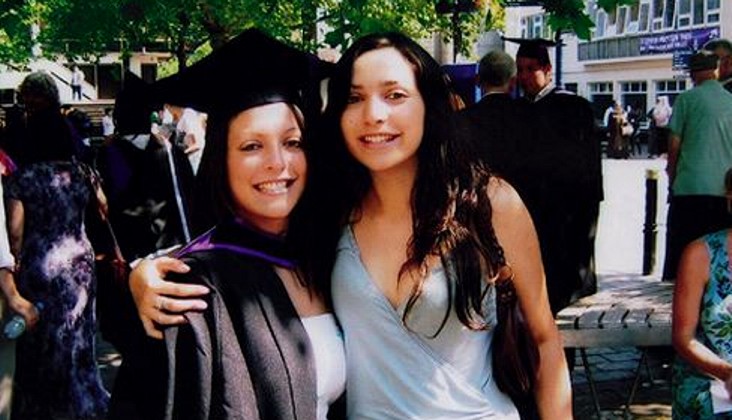
Click the image above for Ryan Parry’s full review. Excerpts here:
1. On Not Ever Wanting To Let Go
When heartbroken John Kercher wakes, he is greeted by a framed photo of his beloved daughter Meredith.
“It’s my favourite picture of Mez,” John says. “She has such a beautiful smile. It’s the first thing I see when I get up every day.”
The photo was taken a year before Meredith left for university in the Italian city of Perugia.
“When I see the photo it makes me smile, but also sad,” says John.
“I always think, why did it happen? Here’s this beautiful young woman ““ and I’m not just talking about looks ““ why would anyone want to kill her?”
2. On Why John Felt He Had To Write The Book
A book that John has written about Meredith was published on Thursday.
It details the painful court hearings but the main focus is the daughter he misses desperately.
“People have forgotten that a young girl has died,” he says.
Leeds University student Meredith ““ who was in Italy on an exchange programme ““ sparkles into life in the book.
John recalls the tiny baby who weighed just 4lbs 12oz. “I could practically hold her in one hand,” he says.
The dad adds: “People ask me, why when I talk about Meredith I always smile. It’s because she was always so witty and laughing.”
3.. And On The Highly Controversial Interim Appeal Verdict
“We’re still trying to make sense of it. It’s not as if someone broke in and killed her, there was no robbery or real motive,” John says.
He does not believe Guede acted alone. “Meredith had 47 bruises. Two knives were meant to have been used. Meredith did karate, for goodness’ sake.”
He adds: “We would never want innocent people put in prison.
“But when you’re presented with that whole body of evidence, by forensic investigators, and it is just overturned without question, it is very hard.”
The Supreme Court in Italy is now examining whether it was right to acquit Knox and Sollecito, with a decision not expected until the autumn.
Thursday, April 26, 2012
Excerpts From Lucy Bannerman’s Interview With Meredith’s Father In Today’s UK Times
Posted by Our Main Posters
I had never cried during an interview, until I met John Kercher. He presses a polite kiss to the cheek when we meet, smiling as he shakes my hand, before quickly apologising for wincing in pain.
His back has been giving him trouble “” he thinks he might have put it out when he sneezed. Still, his manner is warm and engaging and, despite having suffered a stroke three years ago, there is only a slight hint of unsteadiness as we pick a table and order some drinks in the bland lounge of a Croydon hotel.
2. On Rudy Guede Plus… Who?
Rudy Guede, the Ivorian drifter who is the only one who admits being at the scene, and whose murder conviction still stands, is in jail, having had his sentence reduced to only 16 years in a fast-track trial.
Today, Mr Kercher refuses to believe that Guede was the sole killer.
“One person could not have done it.” Of that much, he is certain. “She had 47 bruises. Two different knives were meant to have been used. Meredith did karate, for goodness’ sake.”
Remove Knox and Sollecito, and the only theory left is that Guede was helped by other, as-yet-unknown, accomplices. Which leaves Mr Kercher with even more questions.
“Then why is there not evidence of these other people?” he asks.
The past six months have passed in limbo. He has used the time to write a book that is, in one sense, his attempt to lay out the vast and tangled body of evidence, detailed in 10,000 pages in the original trial, which was overturned by an appeal judge last October.
“As we have always said, we would never want innocent people put in prison. But when you’re presented with that whole body of evidence, by forensic investigators, and it is just overturned, without question “” without question “” it is very difficult.”
3.. On Why John Was Inspired To Write
Ultimately the book is a heartbroken father’s tribute to his daughter. She sparkles through the pages, thanks to anecdotes from friends and family, first loves and flatmates; from the teachers who taught her and even the boy who once proposed. It is instantly clear, and not at all surprising, that Meredith was never short of admirers.
Her father was encouraged to write the book, not just by those who loved the 21-year-old student, but also by strangers.
“I looked on the internet and saw there were so many people saying, “˜We love her smile, she seemed like such a beautiful person, but we don’t really know anything about her’.
“So, I wanted to give people a flavour of what she was like, of her witty one-liners, her kindness.”
He remembers the baby girl who, though not premature, was born at just 4lbs 12oz “” “she was so small I could practically hold her in one hand” “” and the teenager with appalling time-keeping.
He talks fondly of the London bus tour guide, whose tours would always end with a top deck of applause, and the girl who first fell in love with Italy on a school exchange.
“Her teacher told me how, at the end of the exchange, all the other girls were crying on the coach as they said goodbye, except Meredith, who had a big smile on her face. She said she wasn’t upset, because she knew she was going to come back and live here.”
4. On The Hellman Court Not Examing All Evidence
A lack of motive and unreliable forensic evidence led to Knox and Sollecito being cleared by a jury. Much of the case centred on disputed DNA evidence on a kitchen knife and a clasp from Meredith’s bloodied bra.
“That DNA evidence was rejected, but what about all the rest of it?” asks Mr Kercher, for whom so many questions remain unanswered.
“Knox and Sollecito changed their alibi, I think, nine times.”
He does not agree that someone broke into the cottage, as the defence claimed. He believes it was staged. “How could one judge turn around and say the break-in wasn’t staged, when another judge spent eight pages in his original report explaining that it was?
“It doesn’t make sense.”
What does he think happened?
“No idea,” he replies, flatly.
Does he believe Amanda Knox killed Meredith?
He sighs. “Look into my eyes.”
They are full of tears.
“Guess. I don’t want to be vindictive. All I know is that there’s no other evidence of any other people being in that flat at that time.”
5. On Those Profiteering From Meredith’s Death
One thing he makes plain: the Kerchers have never profited from their daughter’s murder. He is disgusted by those who have.
They have turned down countless lucrative media offers.
Any proceeds from the book will go to a foundation they are setting up in Meredith’s name. They are considering whether it might support bereaved relatives who find themselves, like they did, embroiled in financially draining legal procedures overseas.
6. On How Family Life Carries On
He split from Meredith’s mother, Arline, ten years before the murder, and lives on his own in a flat five miles from the former family home. Kidney problems mean that Arline must rely on dialysis three times a week. She and John are on amicable terms.
Meredith’s eldest brother, also John, works in electronics, and is father to his own family. Her other brother, Lyle, works in advertising, while Stephanie, the beautiful sister she so closely resembles, has a career in marketing.
He is not a religious man, Kercher says. But over the past few years he has taken great comfort in what he calls “the white feather phenomenon”.
“I had never heard of it before. But it’s meant to represent the deceased person. It first happened when Stephanie and I were sitting in the garden one summer, and an absolutely white feather landed between us. I looked up. There was not a bird in the sky.”
It happened again after meeting up with a friend of Meredith’s while he was collecting anecdotes for the book.
“We were just saying goodbye in South Kensington when a white feather floated down and landed on her hand. It was really weird. It was so perfect. I actually waited another 10, 12 minutes, after the girl had gone, looking up at the sky.” He laughs at himself for being so superstitious.
“I often look at photographs and say to her, “˜send me a white feather’.”
7. On John’s Continuing Journalist Career
Mr Kercher still works as a freelance journalist. Despite all the heartache, he remains good company, apparently enjoying talking about life as a journalist, sharing anecdotes about the famous people he has interviewed and the book of quotations he has compiled.
“Do you ever get lonely?” he asks, suddenly. The question seems to hang uncomfortably for a moment, before we move on to happier topics, such as the nine times that he ran the London Marathon, his love of jazz and the 70th birthday he will be celebrating later this year.
As the interview draws to a close, he says he has no plans for the rest of the day but to keep writing. “You work to occupy the mind.
“You just carry on. You can’t do anything. You have no influence over events. It’s very difficult.”
John Kerchers Book “Meredith” Is Published In London; US + Italian Publishers Eager To Follow
Posted by Our Main Posters
Above: Meredith’s birthplace. Southwark, on the south bank of the Thames. She very much reflected this spirit.
John Kercher’s book is available from today in the UK and on Amazon Kindle via the links at the top of the page here. We will be posting some excerpts and reviews. We would welcome submissions from anyone waiting for a good opportunity to to do their part. We are all volunteers here.
First glance at the Kindle version suggests this fine book was highly worth the wait and it will become definitive. A huge presence. It shows what a rising star of a woman was cut down, the victim of an arrogant cruel deed by people not even half of her stature.
Saturday, April 21, 2012
In Daily Mail, John Kercher Explains The Context of His Book “Meredith” Available From Next Friday
Posted by Our Main Posters

This article below from the Daily Mail is only John Kercher’s fourth in over four years. His others are reposted in this series here.
In light of one of David Marriott’s negative campaigns already begun, it seems useful for us to frame it here.
In the UK, Meredith’s family have very rarely granted any interviews, and then only to book-writers they felt could be fair. In Italy, they have spoken up only in conjunction with key court milestones, and in one interview with John and Arline on national TV.
They have discouraged others who knew Meredith from speaking up because they felt Italian justice would unaided produce an outcome that was universally seen to be legitimate and fair, and an eventual book remembering the Meredith they knew would be their last word.
This book was not exactly rushed out for tactical reasons, as some of the misled media have implied.
The book was one of two John Kercher wrote three years ago, and he resisted book-agent and publisher requests to make much or most of the book on Meredith about the events in Perugia.
Even now, there is little mention of those events. The book is about what the title says it is about - about the high-achieving daughter and sister that was Meredith - and it is said to be superb.
Meredith’s family welcomed the trial verdict from Judge Massei in December 2009 and commiserated with the families of those found guilty.
They then experienced the periodic harsh quirkiness of the Italian system in seeing cursorily overturned late in 2011 what had seemed to just about every competent lawyer a legally extremely sound result back in late 2009.
Italy is perhaps the only country in the world that automatically makes available two appeal levels, the first of which can involve another jury.
Those second juries too often seem anxious to flaunt their chops, and many in Italy want them abolished. Often strikingly unfamiliar with the details of the evidence and most of the key witnesses, they too often advance a body of tortured reasoning as to why the first jury got it so wrong.
The Italian Supreme Court is known to greatly dislike this “jury wars” tendency, and for the illegal assuming of excessive scope (the scope of appeals is set out in Italian judicial code) a long series of appeal verdicts have been partially or fully thrown out and the cases referred back down to the lower court.
The formidable chief prosecutor for Umbria, Dr Galati, was previously a highly effective deputy chief prosecutor with the Supreme Court of Cassation in Rome.
His criminal-case experience is almost the exact opposite of Judge Hellman’s. While Judge Hellman is one of the least experienced in criminal cases (his normal beat is business and civil law) Dr Galati is one of the most experienced. He really does know how to do effective Supreme Court appeals, in sharp contrast to the present Sollecito-Mellas-Knox teams.
Dr Galati has filed a prosecution appeal with that same Supreme Court (translation due here soon) which targeted various ways in which he considers the first-appeal court to have got the evidence and the witnesses seriously wrong. Even more formidably:
- He specifically appeals against what he considers the illegal very broad scope adopted by Judge Hellman against judicial code on the precise lines the Supreme Court doesn’t like.
- And he specifically appeals against what he considers to be the illegal appointment by Judge Hellman of Conti and Vecchiotti as independent consultants at the first appeal stage.
If such a review was really needed, he reasons, the place for it was at trial - where the defenses, by then very seriously floundering, asked for it only very late in 2009. But they had already had months of opportunity to bring in even more DNA experts of their own - having already failed to show up to observe any of the key forensic tests in the police labs.
Dr Galati will probably like John Kerchers book on Meredith as much as anyone if and when he ever gets to read it. But in this coming third phase there has almost never been any sign that the Italian police, prosecution and judiciary here are doing anything except what the law requires and meeting their usual impressive norm.
Since the Hellman verdict, there’s been much more tracking of the squalid and offensive Knox PR campaign in Perugia and Rome. The idea being falaciously put around in the US and UK, that John Kercher or the family lawyer Francesco Maresca are somehow driving the bus, is considered by Italian lawyers to be ludicrous, and offensive to the Italian courts and Dr Galati in the extreme.
Meredith and her family are very greatly liked and admired in Italy - and it is because of an ABSENCE of manipulation and PR that the legal system is going the extra mile.
On “Meredith” by John Kercher in the Daily Mail.
My daughter Meredith, aged 21, was murdered on November 1, 2007 in her bedroom in Perugia, Italy, where she was studying at the city’s University For Foreigners.
In the days that followed, one of her housemates, an American girl named Amanda Knox, a young Italian man named Raffaele Sollecito, and Rudy Guede, a Perugia resident originally from the Ivory Coast, were arrested on suspicion of her murder.
While Guede remains imprisoned for taking my daughter’s life, last October Knox and Sollecito had their convictions quashed on appeal.
My family and I now find ourselves in a limbo that, I suspect, might never end, wondering exactly what happened in those last moments of Meredith’s life, and how convictions that seemed to offer all the terrible answers two years ago have been so emphatically overturned.
With Knox and Sollecito now free, we find that we are still waiting for justice for our daughter and sister, and have to face up to the possibility that we might never have a satisfactory picture of what unfolded in Perugia on that terrible November night.
Despite everything that has happened since, it still seems as though nobody knows anything about the real Meredith.
The media’s glare throughout the trial and appeal process has been fixed almost entirely on Amanda Knox. Books have been written about her and there has even been a television film focusing on her. It has seemed as if Meredith has been all but forgotten.
In writing this book, I hope to go some way towards redressing the balance, for Meredith was a beautiful, intelligent and caring girl whom everyone loved, and her story deserves to be told.
My hope is that I can share with the world something of the wonderful girl who was our daughter and sister. I hope our telling the world about the enchanting, generous, kind person that Meredith was can help those whose lives she touched.
I also hope this book might help to keep Meredith’s case in the spotlight, and, in some small way, to keep alive the hope that we might yet know the truth about her death.
November 1, 2007, and I am in my local bank in Croydon, South London, when Meredith telephones from Perugia. It is 2.15pm, an unusual time for Meredith to call as we usually speak in the evenings.
But today she does not have to go to university, where she is studying European politics and Italian, as it is a public holiday in Italy.
The call is costing her money, so we don’t have a chance to say much.
I tell her I’ll call her when I get home, but she is going out for dinner with some English friends, so instead we arrange to speak tomorrow.
The next day comes and I find myself at home when Meredith’s mother, Arline, rings. It is 5pm and she has seen on the news that a female British student has been found murdered in Perugia.
I have been divorced from Arline for ten years, and she is living in Old Coulsdon, Surrey. I am worried, but I tell myself that there are many British students studying in Perugia.
Immediately, I call Meredith but all I hear is an automated message. For the next half-an-hour I try her number at least a dozen times, but every time the call goes through to the message.
Then suddenly, after what feels like an age of trying, her mobile starts to ring. I feel some relief and, for the first time, I am confident that my daughter is fine.
Yet, the phone rings on and on, and still there is no answer.
I have to get some information, so I call the foreign desk of a national newspaper. Having worked as a freelance journalist for Fleet Street newspapers and national magazines, it seems the logical thing to do. A man tells me that they have only sketchy details, but if I call back in an hour they might know more.
When I do, I am told by one of the foreign desk editors that Italian police have found the British girl’s mobile phone, and that they have been in touch with people in London.
Again, my hopes rise because this must mean that, whoever this unfortunate girl is, her family and the British police must have been notified.
I have not yet contacted our other children ““ Meredith’s older sister Stephanie, and brothers Lyle and John ““ because I do not want to worry them unduly.
For the next 30 minutes I sit by the phone, trying not to feel so apprehensive. Then the phone rings.
The call is from a young woman on the newspaper’s foreign desk. Hesitantly, she tells me they have a name for the victim. Though I ask for it, she is reluctant to tell me. She seems nervous herself and I have to persuade her to release the name. I shall never forget her words.
“˜The name going round Italy,’ she says, “˜is Meredith.’
I drop the phone. I do not believe it. There has to be a mistake. I refuse to let the facts sink in.
I repeat it over and over to myself: “˜Not beautiful Meredith .”‰.”‰. Not beautiful Meredith .”‰.”‰.’
Numb with shock, I cannot even cry.
I arrive at Arline’s house within an hour. Stephanie, John and Lyle are there already. By now Arline has spoken to the Foreign Office. Officials have confirmed the worst. The dead girl is Meredith.
Everyone is crying. At 9pm, my daughter’s picture is on the news. I stare at it, registering its familiarity but unable to react.
It is as though my feelings have been folded up and removed from me, leaving my mind free to have pointlessly logical thoughts. I can’t say how I passed the night, except I don’t think I slept.
Nothing can prepare you for what it is like to have to travel to a foreign country to identify the body of your daughter. Meredith had told me how beautiful Perugia was.
Now, a little more than two months since she had first moved to the city, we were approaching it for the first time, and she was never coming home.
We met the Italian police at a roundabout, and they gave us an escort to the morgue. They did not speak English but consulate staff acted as our translators.
As we climbed up the steep roads, however, our talk petered out and we all felt the incongruity of the beautiful scenery and our purpose for being there.
There was a large number of officials inside the morgue, including the Chief of Police and the head of the homicide squad. Many of them were close to tears.
It was time to see my daughter. But I could not face going in. The brutal reality of having to see what had been done to Meredith had not really hit home. A small man from the mortuary approached Arline and Stephanie and, leaving me behind, they went through the doors. I could go no further.
For me, it would have put a full stop to my memories. I had seen her only a couple of weeks before when she had flown back to London to buy some winter clothes.
We had met for a coffee at a small Italian restaurant in Croydon, a place where we met often.
We would talk about books and music; the Italian film she had been to see to improve her language; the occasional dance she had been to with her new English friends and the wonderful pizzas she was eating.
On this occasion, Meredith was almost an hour late (this wasn’t unusual).
When she arrived, she talked eagerly about Perugia.
She said she was trying to buy a duvet for her bed, but nobody seemed to know where she could find one. I remember her saying she was determined to track one down. That this should be the duvet beneath which her body would be found is something that will always haunt me.
She had been laughing and was happy. It was the last time I had seen her and I wanted that to be the memory that I held in my mind for ever.
In the morgue, standing over her body, Arline had said: “˜Your father’s come all this way out here to see you, but doesn’t feel he can.’
Then she had smiled, for the last time, at our daughter.
“˜But,’ she had whispered, “˜you know what your father’s like .”‰.”‰.”‰
Caption: Water babies: Meredith, left, aged ten, and her older sister Stephanie enjoying a day at the beachThe news that Amanda Knox was being held for the murder sent shockwaves through our family.
Arline could not comprehend that Meredith’s own housemate might have been involved in this terrible crime.
“˜Amanda? Amanda?’ she kept repeating, in a state of utter disbelief.
We knew Meredith had not got on with Knox. Meredith had expressed irritation to us and to her friends in Perugia at Knox’s personal habits, because she frequently failed to flush the lavatory and Meredith had concerns over how Knox would “˜bring strange men back to the house’, but the idea that this irritation could lead to murder seemed preposterous.
We knew so little of the American girl and absolutely nothing of her boyfriend, Raffaele Sollecito, whom Meredith had never mentioned.
The alibis of Knox and Sollecito kept changing.
At first, Knox claimed to have been at Sollecito’s flat all evening on the night of the murder.
Then Sollecito claimed that she had left his place at about 9pm and had not returned until 1am, during which time he had been on the internet.
Knox then changed her story to say that she had been at the cottage at the time that Meredith was killed.
It was during these first days of questioning that Knox claimed that Diya “˜Patrick’ Lumumba, the owner of a local bar called Le Chic, was the murderer.
Lumumba, of Congolese origin, had been living legally in Italy since 1988, running the bar where Knox had a part-time job.
Back in England, this was the first big piece of news we had heard. Pictures of Lumumba were shown on television, but I spoke to Arline on the telephone and neither of us could believe that we were looking at the killer.
Two weeks later, the chief prosecutor, Giuliano Mignini, asked for Lumumba’s release, saying: “˜There are no longer any serious indications linking him to the crime.’
Lumumba was later quoted as saying: “˜I think that Amanda wanted to derail the investigation…
‘Amanda hated Meredith because people loved her more than Amanda. She was insanely jealous that Meredith was taking over her position as Queen Bee.’
Things became even more distressing. Although we knew Meredith had been killed by a knife wound to her throat, we had not realised it had been preceded by a sexual assault.
The post-mortem had revealed bruising on her lips and gums consistent with her face being crushed on the ground to hold her still. How could anyone do this to her, we asked ourselves? Why had she been singled out for this kind of treatment?
We tried to get our bearings by finding out more about Amanda Knox. I read that she was aged 20 and had been born in Seattle, the daughter of a retail executive and a primary-school teacher.
After only a few years, her parents divorced and Amanda went to Seattle Preparatory School, described as a strict Jesuit institution. Later, she attended Washington University.
Raffaele Sollecito remained a somewhat quiet, bespectacled figure. At the time of his arrest, he was aged 23. The son of a prominent urologist from Giovinazzo in southern Italy, he had led a privileged life. He described himself on a social networking site as being “˜sweet, but sometimes absolutely crazy’.
Sollecito appeared in pictures posted on the internet wielding a meat cleaver. It emerged that he was passionate about collecting knives.
After the murder, police searched his flat and discovered a collection of Japanese manga comics, some of which depicted acts of extreme violence.
One which attracted particular attention was concerned with the killing of female vampires at Halloween. It was not lost on police that Meredith had been dressed as a vampire to celebrate Halloween only one night before she was murdered.
Police later went on to say that the scene they discovered at the cottage was reminiscent of the scenes depicted in Sollecito’s comics.
A short while before Patrick Lumumba was released, the investigation took another decisive turn.
The police identified a bloodied fingerprint on Meredith’s pillow that belonged to one Rudy Hermann Guede, an immigrant from the Ivory Coast who had already been arrested for petty theft and drug dealing.
DNA taken from his toothbrush matched DNA found on and inside Meredith’s body.
This seemed to tie Guede to the scene of Meredith’s murder. Witnesses had already described a man of African origin fleeing the cottage on the night of the murder, later to be seen washing clothes in a launderette.
Guede had arrived in Italy from the Ivory Coast in 1992, aged five, with his father. When Guede was 15 his father had returned to Africa.
Extradited from Germany where he had been lying low, Guede was now concerned that Knox and Sollecito might attempt to pin the blame solely on him, so his defence team requested that he be tried on his own by a single presiding judge.
This “˜fast-track trial’ would take place during pre-trial hearings.
The request was granted. Armed with 10,000 pages of documentation, the judge, Paulo Micheli, heard evidence from forensics experts regarding the various DNA findings, Sollecito’s DNA having been discovered on Meredith’s bra clasp, and a bloodied footprint having been revealed as belonging to the young Italian man.
There was also the presentation of evidence that Knox’s bloodied footprints had been found in the cottage’s hallway and bathroom; that her DNA had been found in blood mixed with Meredith’s in the bathroom; and that her DNA had been shown to be on a knife handle, with Meredith’s on the blade ““ a knife that police had found at Sollecito’s apartment and which, the prosecution claimed, had been removed from the scene of the crime.
Judge Micheli also heard Knox’s and Sollecito’s defence teams attempting to refute much of the evidence, specifically the DNA evidence, which they blamed on contamination and poor forensics procedures.
This was to be a major contention in this pre-trial, the main trial and, later, the first appeal.
Regrettably, a key piece of evidence ““ the bra clasp ““ was not retrieved from the crime scene until 47 days after the murder because it had been hidden from view.
On October 28, 2008, Arline, Stephanie, Lyle and I returned to Perugia to hear the verdict on Guede.
After a nerve-racking wait, we were called to the court at 9pm. Photographers jostled at the entrance and we were guided in, individually, by police escorts.
I felt almost light-headed with lack of sleep; looking at Arline, Stephanie and Lyle, I saw the same strain on their faces. There was a tense silence.
Amanda Knox sat with her lawyers, as did Raffaele Sollecito and Rudy Guede with theirs. They had been brought in under armed guard. Judge Micheli entered and everyone rose to their feet.
The chief of homicide, Monica Napoleoni, stood at my side, ready to convey the verdict.
As the judge began his statement, Ms Napoleoni looked at me, squeezing my hand, then concentrated on what the judge was saying. It was in Italian, so we had no idea what was being said.
The judge had been deliberating for 12 hours about his decision. This was the moment.
Suddenly, Ms Napoleoni turned to look at me and squeezed my hand again, nodding emphatically.
Rudy Guede had been found guilty of complicity in Meredith’s murder and sentenced to 30 years in prison. Knox and Sollecito had been indicted on charges of murder and sexual violence and would stand trial.
I did not know what to feel. It was certainly not relief because I knew that this was only the beginning.
After this, we would have to go through the main trial. I can only say that we were not elated ““ but we were satisfied that justice was progressing in the right direction.
It was not a moment any of us could relish. In our hearts, all we wanted to know was what had happened to Meredith and why she had to be taken so cruelly away.
As her sister Stephanie said at Meredith’s memorial service: “˜Anyone who was fortunate enough to have known her would testify that she was one of the most caring people you could ever meet.
‘Nothing was too much for her. She was a loyal daughter, sister and friend.’
It is not only our family and her friends who have lost her. So has the world.
I Will Always Love You, she sang in her haunting voice
During those days following Meredith’s death, I would immerse myself in photographs and lose myself in memories of her jokes, her wicked one-liners and her laughter.
Then recently while cleaning my home, I came across a shoebox containing roll after roll of undeveloped film. They have since been developed and I have seen that wonderful smile once again. In one picture I particularly love, Meredith is opening her Christmas presents by the fireplace.
On Christmas Eve I would pull some ash into the fireplace and draw small footprints to show that Father Christmas’s boots had landed there.
Meredith was due on December 25, 1985. But, as was to be the pattern of her life, she was late, and it was on December 28 that Arline was taken to Guy’s Hospital in London.
I set out in the car with John, Lyle and Stephanie to drive the 18 miles to the hospital. The weather was freezing and after about ten minutes, there was a rattling sound coming from under the car bonnet. I discovered the water in the radiator had turned to ice. We abandoned the car and dashed to the nearest station, Purley, to continue our journey by train.
I like to think that it was because of the season she was born in that Meredith loved winter, especially when it snowed and she could get out her plastic sledge.
In October 1987, when Meredith was nearly two, a 120mph hurricane came through Old Coulsdon. Arline and I huddled on the upstairs landing with the four children. That night, an 80ft tree slammed across the back of the house, a long branch smashing through the girls’ bedroom window. It was a fortunate escape.
Meredith liked going to the coast and we visited Brighton regularly. Sometimes we had a picnic on the beach. Then there were the Lanes, a maze of narrow streets filled with cafes, bistros and antiques shops. She was fascinated by this place and I often picture her there.
In 1997, Arline and I agreed to divorce, and I moved into a flat in Croydon.
During that first week of living apart, I came home to find Meredith had left a message on my answering machine, singing Whitney Houston’s I Will Always Love You.
Her voice was beautiful and haunting, and I think I cried on hearing it. I kept it there, playing it several times every day until the telephone service provider deleted it.
Meredith would come for dinner every Friday after school. I would cook and then we would watch videos of the hit comedy series Friends.
She also loved clothes, so one day I took her to Selfridges in Oxford Street. I thought she might like to spend half an hour there. How stupid of me! I should have taken a packed lunch. A more fruitful shopping spree was when Meredith, then 14, Stephanie and I travelled on Eurostar to Lille.
We had a wonderful lunch and then the girls discovered some clothes shops. I had to visit a cash machine a couple of times to pay for all their purchases.
Some memories, however, brought me back to Meredith’s final night. I could not help thinking of the hours Meredith had spent practising karate, and how she must have fought back on the night she was murdered.
Against one person, we were all certain, Meredith could have held her own.
Did stress cause my stroke?
During the summer of 2009, I suffered a stroke. I’d had bouts of dizziness, which my doctor thought might be attributable to an ear condition, but then in July, I was hit with the stroke.
I was in hospital for several days and had double vision for weeks afterwards.
I will never know whether the stress of Meredith’s death and the subsequent trial affected my health, but it made me question how many more times I could make the trip to Perugia, and how much more of the chaos I was able to bear.
How the Foreign Office let us down
We were surprised at the lack of financial help available from the British Government as we dealt with the aftermath of Meredith’s death.
We had received tremendous support from the British Consulate in Florence, which arranged translation facilities and made transport arrangements, but despite our pleas, we did not receive any financial support from the Foreign Office.
A number of MPs campaigned on our behalf for some contribution towards our flights, but their efforts were to no avail.
Indeed, it seemed this was a policy decision, one that did not affect just us, but anybody who had suffered an ordeal such as ours. This lack of help was despite the fact that we were obliged to provide testimonies in court.
Nor could we expect any help from the Italian government. Before Meredith was murdered, EU states had said they would sign an agreement to compensate the families of foreign nationals who were victims of a violent crime committed in their country.
However, of all the states, Italy failed to sign the agreement in time.
Financially we were alone and it made the business of attending the trial, and seeking justice for Meredith, all the more problematic.
Saturday, October 15, 2011
John Kercher’s Book “Meredith” To Be Published By The Second Largest Publishing Group In The World
Posted by Peter Quennell

[Above: Giant publisher Hachette Livre’s headquarters is in the 15th Arrondissement of Paris to the right]
London-based publishers Hodder and Stoughton (image below) are an arm of the French publishing giant Hachette Livre.
Hodder and Stoughton have purchased the rights to “Meredith” from John Kercher’s hustling literary agent Ben Mason in very competitive bidding at the Frankfurt Book Fair. From the Bookseller website:
Editorial director Fenella Bates bought world English rights from Ben Mason at Fox Mason. The book will be published in hardback in April 2012.
Billed as a “celebration of Meredith’s life”, the title is also a father’s story of losing his daughter, and will be the first account of the lives of the Kercher family since her murder four years ago.
Bates said: “Here at Hodder we feel this is an important story that needs to be told. We are privileged that John Kercher has entrusted us with his book, in which he’ll talk for the first time about the case and Meredith’s life.”
John Kercher has had a number of other books published. He completed two books about two two years ago as his literary tributes to Meredith, and his way of conveying her to the world.
We mentioned the other book early this year: The Strange Case of Miss Carla. That book is a collection of children’s tales John created which Meredith loved to hear in her teens.
Her family prefer that proceeds from “Meredith” go toward an Italian remembrance of Meredith which they have not yet defined. They chose this as their goal as Meredith really loved Italy and because Italy is still obviously fascinated with her.
Her case in Italy is always referred to as the Meredith case, not the Amanda Knox case, and her Mediterranean looks, her wide range of talents and accomplishments, her strong sense of purpose, her empathy for other people, and her sense of humor are much admired.
Below: images of the Frankfurt Book Fair, and of the London headquarters of Hodder and Stoughton in Euston Street.
Wednesday, October 05, 2011
Andrea Vogt’s Interview With Meredith’s Family In The First Post
Posted by Peter Quennell
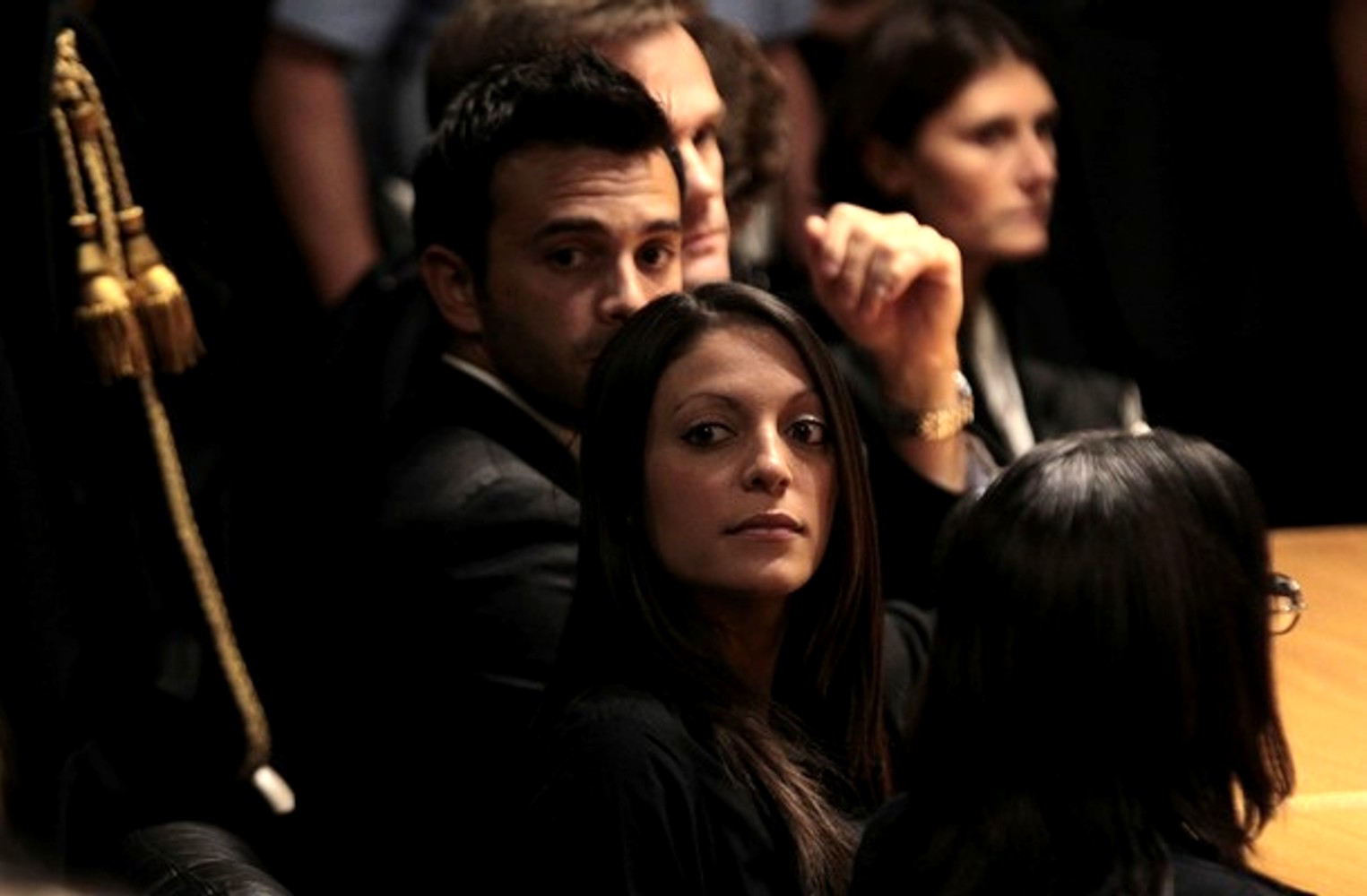
Click above for the interview with Arline, Stephanie and Lyle in Perugia yesterday morning.
They miss the most ordinary things - the way she used to come dancing into the living room or rugby tackle her brother… her quick-witted sense of humour.
“It’s so sad. At the age she was killed, there was still so much ahead. We had so many laughs and good times ahead that we will never have.”
Tuesday, October 04, 2011
ABC News Reports On The Low-Key But Bewildered Reaction Of Meredith’s Family
Posted by Peter Quennell
Click image above for Colleen Curry’s report. An excerpt:
The Kercher family, who earlier in the day professed its belief that Knox was involved in Meredith’s death, remained behind in the courtroom long after the Knox family and its supporters poured into the streets in celebration. Arline Kercher was held upright by her daughter and attorney as she made her way through a crowd of reporters to a waiting vehicle.
The article mentions that Meredith’s family has issued this brief statement.
We respect the decision of the judges. But we do not understand how the decision of the first trial could be so radically overturned. We still trust the Italian judicial system, and hope that the truth will eventually emerge.
Monday, October 03, 2011
Awaiting Appeal Court Verdict, Arline And Lyle And Stephanie In First Press Conference:
Posted by Peter Quennell

The family was fair but firm that their priorities are justice for Meredith and her remembrance.
This first report on the press conference (probably the first of two) is from the Daily Telegraph.
Stephanie Kercher said her sister had been “hugely forgotten” in the furore around the appeal launched by American student Amanda Knox and her Italian ex-boyfriend Raffaele Sollecito over the November 2007 killing in Perugia, Italy.
Sitting alongside her mother Arline and brother Lyle, she told a press conference: “It is very difficult to keep her memory alive in all of this.”
Miss Kercher said forgiveness “does not come into it” at the moment. She went on: “It would be very difficult to forgive anything at this stage.
“What everyone needs to remember is ... the brutality of what happened that night, everything that Meredith must have felt that night, everything she went through, the fear and the terror, and not knowing why.
“She doesn’t deserve that, no-one deserves that.”
Meredith’s mother Arline refused to say whether she believed Knox killed her daughter but said she trusted the Italian justice system.
She added: “You have to go by the evidence because there is nothing else. What I want, what they want doesn’t come into it.
“It is what the police have found, what the science has found, what the evidence is and that’s all you can go on.
“It is to find out what happened to Meredith and to get some justice really.”
Sunday, September 25, 2011
Meredith’s Sister And A Perugia Friend Share How Very Much This Funny Very Talented Girl Is Missed
Posted by Our Main Posters
[Above: TJMK main poster ViaDellaPergola’s video tribute to Meredith, first posted soon after the trial concluded[
From Ryan Parry’s interview with Stephanie Kercher in The Daily Mail:
“As I told a friend recently, my sister would have been 26 this year and I was in tears because I can’t even begin to imagine what she would have been like at that age. I can only remember her as 21 and before that.
“She would have finished university, maybe be working and with a boyfriend and I think of all the things we would have done together.
“We used to dance around our rooms together, watching films, going shopping. All the girly things that you do.
“We grew up together and there was only two-and-a-half years between us, so we were very close. When we were at uni we would send each other emails asking how each other was getting on. We’d also share responsibility of looking after and supporting Mum, who has been ill for a long time.
“As a sister I have missed out hugely on all of that. It’s something I am never going to know.”
For Stephanie, of Coulsdon, South London, it’s the little things which get her most upset.
The two sisters used to write secret notes to one another and pass them under their bedroom doors.
She adds: “I found a lot of the notes and they would make me smile or cry depending on what kind of mood I am in. We had photos developed the other day of when we were both little. They made me grin but I also felt sad.”
Stephanie has a silver bracelet she gave Meredith on her 21st birthday as a keepsake. Another gift to her sister, a pendant, was placed in with Meredith’s body at the funeral.
“I have also kept all the cards Mez has ever given me, teddies and things that she’s brought me back from places,” she says.
From Nick Squires’s interview with Natalie Hayward in The Daily Telegraph:
“When I got to Perugia, I was depressed. I’d broken up with the man I thought I would marry. Meredith was the only one who was totally non-judgmental. That was wonderful because I was feeling lonely.”
Miss Hayward remembers one of her tutors in Perugia warning her and Miss Kercher to be careful in the Umbrian hill town, saying hidden dangers lurked amid its rowdy student bars, cobbled piazzas and medieval passageways.
“We laughed about it. We were thinking ‘What’s to worry about? This is a tiny little town and we’re from London.’ It’s horribly ironic now.
“But Perugia can secretly be a dark place. It’s quite druggie.”
As for her friend, she said: “She was clearly intelligent and worked very hard. She was always talking about her family.
“She was very friendly ““ I still have text messages from her in which she persuaded me to go out in the evenings. She was generous and open and had a very big heart.
“She was a very fulfilled human being. She was happy and talked about her family all the time. She had lived life to the full. That gives me a great deal of comfort.”
Monday, September 05, 2011
In Good Italian Meredith’s Family Remind Italy Of Who Is The Real Victim Here
Posted by Peter Quennell
Stephanie Kercher writes an open letter (two of Meredith’s family are conversant in Italian, and Meredith had been fluent on arrival in Perugia) to Judge Hellman.
She questions the very strange slant of the DNA report in which Greg Hampikian seems to have had a suspect role.
The letter is very widely quoted from in the Italian media which has been highly sympathetic to Meredith and generally left cold by the antics of Knox, Sollecito, and their entourages.
CNN carries one of the few English-language reports. Generally a good one though it omits that Rudy Guede accused Knox and Sollecito to their faces in appeal court.
No English version was issued to our knowledge, and this is our main poster Tiziano’s translation, from TGCom.
In the last week we have been anxiously awaiting and in great agitation at the opinions being spread around about the original DNA tests. It is extremely difficult to understand how the evidence which had been acquired with care and presented at the first grade trial as valid can now risk becoming irrelevant.
How can a quantity of DNA evidence be considered of little importance when the same experts do not give precise answers on the quantity which ought to be taken into consideration?
Furthermore, it should be remembered that both the parties, the prosecution and the defence, engaged their own respective teams of scientific experts in the first level trial, in addition to the consultants of the Scientific [Police] in Rome.
The [representatives of the] defence seem to be focussed on and to base themselves heavily on these two pieces of DNA evidence, but we want to remember for a moment who this case is about: my sister, a daughter brutally taken away from us almost four years ago and still not a day goes by when we can find a little peace or to put an end to all this.
All those who read this document or who are following this case, please remember our beautiful Meredith. Her blood mixed with other samples spread around the bathroom, along the corridor and in Filomena’s room, and also so many other bloody prints. Remember too all the other evidence which has been presented up till today in this trial, 10,000 pages of evidence.
We still have confidence in the Perugia police and all our trust in all those people from the court and the investigations.
We ask that Appeal Court weigh up every single piece of evidence, scientific and circumstantial, together with every witness heard and that [the court] do this independently of every other source of information and [independently] of the media.
In the midst of all the frenzy created by the media, Meredith has been forgotten, she is no longer with us, yet everything that should be for her and [done] in order to understand what really happened that tragic night.
We have not forgotten her, and we will continue our struggle in order that justice be done with the continuing support of our lawyer Francesco Maresca and of his colleagues, the Police, the Public Prosecutor, the prosecution and all those taking part in this in Italy and also all those who in all the world still think of us and of Mez.
We would like to have the possibilty of working with Universty of Perugia on a project which would offer an annual place to a student in memory of Meredith. Meredith loved Italy and its people and wanted to immerse herself in Italian culture. We are well aware of the impact that all this has had on the city and we think that this is an appropriate way to commemorate Meredith in the beautiful place for which she left us to come and study.
Please do not let it be that Meredith died in vain, her courage and her strength continue to struggle and we shall look for justice so that she may rest in peace. She did not stop struggling that November 1st, and we shall not stop now.
Stephy Kercher
Sunday, March 13, 2011
New John Kercher Article: “As A Little Girl Meredith Was Funny, Clever And Extremely Self-Assured”
Posted by Our Main Posters

By Meredith’s father John in today’s Sunday Times:
To my knowledge nine books have been published about the Amanda Knox murder case, with one more on the way. There have been five television documentaries. A made-for-TV film was shown in America last month, and there are plans for a British film, possibly starring Colin Firth. The news media seem transfixed. Knox’s supporters post their views online and plan a “bowling fundraiser” next Sunday in Seattle, her home town.
There is someone missing from this obsession with “Foxy Knoxy”, as the 23-year-old student was quickly nicknamed in the press. Meredith Kercher, my daughter, was killed that night in Perugia, Italy, 3½ years ago. It’s time to tell her story - and the story of her family, for whom there are no appeals against Meredith’s death, but only a long, painful and extremely expensive emotional limbo as the Knox saga grinds its way through the Italian courts.
In December 2009 Knox and her boyfriend, Raffaele Sollecito, were sentenced to 26 years and 25 years respectively for killing Meredith. An Ivorian drifter, Rudy Guede, had already been convicted at a fast-track trial and sentenced to 30 years, reduced on appeal to 16. We attended the sentencing of Knox and Sollecito in Perugia. As Meredith’s brother, Lyle, said afterwards, it was not a moment for celebration; more one of satisfaction that some verdict had been reached. But our agony did not finish there.
We would like to be able to remember Meredith for the loving, humorous and caring person she was, rather than a murder victim. But under Italian law Knox and Sollecito have a right to two appeals: one to the court in Perugia, which is in progress, and, if that should fail, a further one to the Supreme Court in Rome.
The result of the current appeal is not expected until September. Should it go against them, then at least a year or even years could pass as the second appeal is heard. This is the stuff of nightmares, compounded by the way that Knox has been turned into a celebrity and the murder into entertainment.
I saw the trailer for the American TV film about her and was horrified by the scene that purported to depict the killing of my daughter. It was removed before broadcast but Meredith was still shown with a bloody wound in her neck. Mez, as we called her, should not be remembered by the way she died but by how she was for the 21 years of her short life.
As a little girl she was funny, clever and extremely self-assured, with a wonderful singing voice. At about five she told me she wanted to be a pop star. When a girl with whom she was meant to do a duet at junior school fell sick, Meredith performed the song alone. Other parents came up afterwards to compliment her nerve and ability.
She wasn’t a show-off. Her talents often surfaced spontaneously - such as when she picked up a toy guitar at home, stuffed a cigarette in her mouth, pulled her hair down over her face, stuck a hat on her head and did an impression of Slash from Guns N’ Roses. It was hilarious.
As she became older, she showed high academic ability, winning a place at Leeds University to study European politics and Italian. She was meant to be on a four-year course that included a year’s study at an Italian university, but she discovered that, because of a mix-up, she had been put on one with no year abroad. She was horrified and fought for months to be reinstated - successfully.
Meredith loved Italy, having been there several times with her school and a couple of times on family holidays. At the end of one exchange trip near Naples, most of the English students were in tears at having to say goodbye to the Italian families they had stayed with. Meredith, however, was smiling “because I know that I’m going to return and that, some day, I’m going to live here”.
She had a choice of three cities for her year overseas: Rome, Milan and Perugia. She chose Perugia because of its medieval quarter and the hope that it would be easier to make friends there than in a big city.
She flew out in late August 2007, checked into a family hotel for three nights and went to the University for Foreigners to look for accommodation in the town, eventually finding a room in a cottage. She rang to tell me about it, saying two Italian girls already had rooms there and an American girl would be joining them later.
Meredith had lived with Arline, her mother, since our divorce in 1997, but we had spoken every evening on the telephone and she came to dinner with me after school every week. We continued our conversations every evening when she was in Italy. She told me about her studies, the wonderful restaurants she had been to and the places she was hoping to visit.
She came back from Italy for a weekend to clean the house for her mother, who was suffering renal failure. That was the sort of person Mez was - very caring, not simply to family and friends but to strangers too. Once, working part-time in a restaurant, she saw that a female customer with a young child had had too much to drink. Meredith paid for a cab to get them home safely.
This was the person who was savagely murdered on November 1, 2007. I had spoken to Meredith that afternoon. It was Ognissanti, All Saints’ Day, a public holiday in Italy. She told me she would be out that evening but would talk to me the next day. My last words to her were: “I love you.”
The following evening her mother called, telling me that a British student had been killed in Perugia. I never dreamt that it was Meredith, and so I telephoned her number to see if she knew anything. At first I got an answering machine. After dialling a dozen times or more, I heard a ringing tone at the other end. That was a relief. I assumed that she wasn’t answering because she was in a different room.
An hour later, still getting no reply, I became worried and rang one of the national newspapers that I write for. Its foreign desk told me, after checking with Italy, that the police had found the dead girl’s mobile phones and had been in touch with people in London.
I was relieved. Whoever the poor girl was, she couldn’t be Meredith, because her family had presumably been informed. Half an hour later, however, I was told that the name going round Italy was Meredith. I was in shock. A friend drove me to Arline’s house. After a couple of hours Meredith’s picture came up on the television; by then the Foreign Office had confirmed that it was our daughter.
We flew to Italy to identify her. The press outside the morgue was crying, as were the police, and I couldn’t go in to see her. I wanted to remember her as she had always been. I had seen her only a few weeks earlier, when she had been on a shopping trip to London for winter clothes to take back to Italy. She had been so proud of her new boots. That was how I wanted to remember her.
Then the long legal process began: investigation, arrests, trials and now the appeal. The defence lawyers are contesting the DNA evidence from the alleged murder weapon, a knife found in a drawer at Sollecito’s apartment. They say the DNA samples - Meredith’s on the tip of the blade, Knox’s on the handle - are too small to be admissible as evidence. They also argue that DNA on a clasp from Meredith’s bra, found in her room six weeks after her body was discovered, could have been contaminated.
This is disputed by the top forensics team from Rome, led by Patrizia Stefanoni, an internationally respected forensic scientist. The fact that recently, in Britain, someone was convicted on 17-year-old DNA evidence is ignored by the defence.
Knox’s supporters in America, while concentrating on the DNA, do not seem to be aware of the huge body of other evidence that was given. Under Italian law a judge has to write an official report on how a verdict was reached. Judge Giancarlo Massei, who presided at the trial of Knox and Sollecito, produced a 400-page report.
It is quite revealing, showing that - although Knox’s DNA and Meredith’s genetic material were found mixed together in several locations in the bathroom - much more than the DNA evidence was responsible for the decision to convict. For example:
- Sollecito claimed to have been working at his computer on the evening of the murder, but computer records show that it was inactive. Both Sollecito’s and Knox’s mobile phones were switched off that night.
- A witness saw the couple several times in the vicinity of the cottage on the night of the killing, although they said they were at Sollecito’s home. Their alibis changed nine times, with Sollecito saying that he could not remember whether Knox was with him all evening. They even hinted at putting the blame on each other. Apart from Meredith, only Knox and two other flatmates, who were away at the time, had keys to the cottage.
- Sollecito’s naked footprint was found on a bathmat in the cottage; and Knox’s footprints were found outside Meredith’s room, in the passageway and in another room, where police believe a break-in was staged. (These footprints were revealed with luminol, a chemical used by forensic investigators to detect traces of blood at crime scenes, as it glows blue in reaction with the iron in haemoglobin. It can show bloody footprints even after attempts to clean them away.) nAs for the “break-in”, the police immediately noticed that glass from a broken window was on top of clothes supposedly scattered by an intruder. The glass would have been under the clothes if the window had been broken before the room was ransacked. No valuables were taken, and a real burglar would have found far easier access to the house without breaking a window.
- Sollecito told the police that nothing had been taken from the room supposedly broken into. But how would he know? It was used by an Italian girl, not present on the night of the killing, who had not yet checked it out for herself.
- Knox described the position of Meredith’s body and how she had died, although she had not been able to see into Meredith’s room when the door was broken down by the police.
There are many more factors, almost 20 in all, among them the suspicion that there may have been something ritualistic about Meredith’s death. The prosecutor was criticised for mentioning this, but she was killed on the eve of the Day of the Dead, November 2. Sollecito was said to have Japanese manga comics that described the rape and killing of female vampires. Meredith had been dressed as a vampire to celebrate Hallowe’en.
In addition, the Supreme Court in Rome has recently issued its report on Guede’s appeal. Pointing out that there were more than 40 wounds on Meredith’s body, it found that he did not act alone and that two others were involved. There is also a suggestion that her body and the room were rearranged after the killing.
Guede, who admitted having been in the cottage on the night of the murder, fled the premises and went to a disco before escaping to Germany, where he was arrested. So who cleaned up the house in an attempt to remove all traces of their presence that night?
While not wanting to complain, I find it odd that the British government will not help us pay for travelling expenses to the courts in Italy, which we have had to attend on five occasions so far for the trial and appeal.
The British consul in Florence was marvellous, providing emotional support and translation facilities, and two MPs have tried to get us financial backup; but the Foreign Office says it does not pay for costs of attending court hearings abroad.
Each European Union country is supposed to provide some sort of compensation for the family of anyone from another EU nation killed on its territory; but Italy did not sign up to this, so nothing has been forthcoming from Rome. We have had to fund everything ourselves. It adds up - about £40,000 so far.
In court our lawyer demanded E21m (£18m) in compensation from the defendants, but this was a purely symbolic amount, seen in Italy as a way of demonstrating the severity of the case. Anyone assuming we received such a sum is under a misapprehension.
It is now into the fourth year since Meredith’s death, and the pressure of grief is still upon us. It has been constant torment, but the memory of Meredith will continue to stay with everyone. Leeds University planted an oak tree in her memory; and, with our family, students released balloons bearing messages for her. Her school, Old Palace in Croydon, planted a cherry tree for her. Every year, on the anniversary of her death, at Christmas Eve and on her birthday (December 28), our family and Meredith’s friends go to the cemetery to leave flowers and cards for her.
Recently I unearthed a book I wrote for Meredith. She was 14 and I was visiting her at her mother’s house. When the time came for me to leave, she suddenly asked me to tell her a bedtime story. I laughed and said I had told her one from when she two until she was 12, and I had run out of ideas. But she was insistent. So I told her I would go home, write something and read it down the telephone to her.
That’s what I did, with her as the lead character, and she loved it and wanted more. So I continued and it turned into a novel, The Strange Case of Miss Carla. I like to think that this is my tribute to a wonderful daughter.
Tuesday, February 08, 2011
“The Strange Case of Miss Carla” John Kercher’s Brilliant Idea Of A Tribute To Meredith
Posted by Peter Quennell
These images above and below are scenes five minutes south of where Meredith grew up, where the southern edge of London becomes beautiful rural Surrey.
Meredith’s father John has now made public that he has put on paper bedtime stories including some he told Meredith at bedtime in her house just to the north of these places when she was a little girl.
The London media reports are here and here.
Meredith herself in a real sense set this book of stories in motion. John was once at her house when she was 14 years old, and as he left in the evening, she asked him to tell her a bedtime story.
He said he’d told her bedtime stories from when she was two years old until she was about 12 but for now he’d run out of ideas. But she was quite insistent. So John told her he would go home and write something and read it down the ‘phone to her; which he then did.
She loved it and wanted more, and so he continued with it for a long while until it became a 60,000 word novel. John Kercher has linked these very special stories together with a narrative that has Meredith traveling through time.
If John does try to get the book published, it would simply be submitted with no background and the publisher would not be told the connection. It would stand on its own.
Still, few stories have a way of resonating through life and on down the ages like those bedtime stories we hear in childhood.
And this seems an impressionistic, elegant, deeply moving way of keeping the thought of Meredith alive for those in the know without being remotely invasive. Quite brilliant.
Sunday, October 31, 2010
More Anger Toward Hayden Panettiere For Arch-Callousness Toward Meredith’s Family
Posted by Peter Quennell
Above: Another with the symptoms of a charming psychopath, explaining how Meredith was killed?
Panettiere is reported as refusing to mention Meredith by name. In line with the standing orders of PR campaign, she seemingly wants to disappear Meredith. Make her a non-person.
The anger toward Panttiere among those who knew Meredith or closely identify with her, as we do, is growing stronger by the day. Now there is a scathing commentary by Jenny McCartney on The Daily Telegraph’s website
With depressing inevitability, the cameras began rolling last week on a TV movie about Amanda Knox, the young, blonde American convicted in Italy for her role in the killing of a 21-year-old fellow student, Meredith Kercher, in 2007.
Hayden Panettiere, a rising star, is playing Knox. The actress described herself as “flattered” to be awarded the role, blithely adding: “It’s a really great story and a very controversial one.”
Both the comment, and the film, strike me as being in disgustingly bad taste. For it is not, of course, “a really great story”, but an intensely sad and very recent criminal case, in which an intelligent and beautiful British student was murdered.
The Kercher family, who demonstrated considerable dignity through a long and heavily sensationalised trial, must now be subjected to the additional pain of knowing that the circumstances of Meredith’s death are already being converted into entertainment.
Even Knox’s Italian lawyer, who is presently appealing against her conviction, has strongly denounced any such “exploitation of the situation”.
The truth is that the film’s backers glimpsed a case in which both the murderers and the victim were young and attractive, and ““ in their eagerness for a salaciously brutal storyline ““ abandoned all other considerations.I don’t suppose the film industry ever had much of a conscience: the difference now is the confident assumption that the public doesn’t, either.
Click the Daily Telegraph link to read also the well-informed and very critical comments by commenters Jo Jones and Mutley.
Tuesday, December 08, 2009
US Overreaction: Meredith’s Mother Regards Cantwell’s Grandstanding As Ill-Informed
Posted by Peter Quennell
This was just reported by Tom Wells in tomorrow’s The Sun
The mum of murdered Meredith Kercher yesterday blasted killer Amanda Knox’s supporters for enlisting Hillary Clinton in her appeal battle….
Ms Cantwell suggested the 22-year-old did not get a fair trial and expressed worries over possible “anti-American” bias in the Italian court. Mrs Clinton, wife of former US President Bill, has now vowed to meet with “anyone who has a concern”.
But Meredith’s mum Arline yesterday insisted Knox’s hearing WAS fair - and said she did not sense any anti-American feeling in the Perugia court.
Mrs Kercher, 64, said at her family’s home in Coulsdon, Surrey: “We are still getting over the sentencing. The whole thing has gone in a blur.
“Having them say they are looking to lodge an appeal was tough enough - and now this. I just do not know where they are going by getting people in high places involved.
“I was in no way aware of anti-American feeling. It was just a normal court. Everything seemed to be done fairly. It seems a bit desperate, but the Italian justice system should be the ones to answer whether it was fair or not.
“We were not exactly given special treatment. I can’t see there was this anti-American thing.”...
Monday, December 07, 2009
Meredith’s Mother Says In An Interview That The Real Life Sentence Here Is Theirs
Posted by Peter Quennell
The question seems to be spreading now of whether Knox’s and Sollecito’s sentences were simply too light.
Two of the jurors have spoken out about their teary sympathy for Amanda Knox. No similar judge or jury sentiments were offered about the real victim here, the one with the first name of Meredith.
Now a UK Press Association report has gone viral on a Daily Mirror interview with the family. This below is the actual Daily Mirror interview kindly emailed to us from London (it is not online) and not the abbreviated Press Association report.
It tells of the crushing sadness of Meredith’s mother Arline - and the life sentence the perpetrators handed to her.
EXCLUSIVE: MURDERED MEREDITH’S FAMILY SPEAK FOR THE FIRST TIME
ON most days Arline Kercher stops at the door to her daughter’s bedroom, waits for a second then slowly looks in.
Everything is neat and tidy with nothing out of place - just how Meredith left it.
Arline’s eyes well up with tears as she scans the room full of her daughter’s clothes, shoes and CDs.
More than two years after the 21-year-old - affectionately known as Mez - was brutally murdered in Perugia, central Italy, it is painfully clear how closely her memory is cherished by her family.
Arline, 64, says: “It’s still Mez’s room and has barely been touched. It’s not a shrine to Meredith but it is a constant reminder of her.
“When I’m walking past with a pile of washing in my hand I get a feeling of sadness. It’s hard not to. It’s almost as though she’s just gone out and will be back in a while. But she won’t.”
Meredith remains such an integral part of their lives that they refuse to even consider ever leaving the family home in Coulsdon, Surrey.
“That’s my way of handling it,” Arline insists. “If we moved, she wouldn’t know where I am. It’s silly really.” She, husband John and their three children Lyle, John and Stephanie agreed to speak as a family for the first time since those dreadful events of November 2007.
Amanda Knox 22, was given a 26-year sentence last Friday and exlover Raffaele Sollecito, 25, received 25 years, even though prosecutors wanted full life terms.
A third man, Rudy Guede, is already serving 30 years for the murder.
Speaking in Perugia after the verdicts, the Kerchers’ overwhelming emotion remains the pain of losing Meredith - and a numb relief that her killers are finally behind bars. Arline says the family have been “living a nightmare” for two years and adds poignantly: “We’re the ones who have been given a life sentence.
“We have to live with what’s happened for the rest of our lives. People say time heals - but it doesn’t.” Lyle, 30, says: “The feeling isn’t of celebration. A verdict has been delivered that we’ve been working towards and that’s it. For me every significant stage of the process is a step towards relief, or closure as people call it.
“But until the appeal is over there’s still that black cloud hanging over everything.” Despite his sister’s horrific murder - in which she was sexually assaulted and her throat slashed - this dignified family sees no sense in venting anger at the killers.
Lyle explains: “It won’t bring her back. I was shocked when the verdict came in. You don’t know what to feel. Whether the anger will come later or in waves, I don’t know. What we have noticed is that others in the family have shouldered the anger for us.”
Stephanie, 26, adds: “People always ask us about Amanda Knox and Raffaele Sollecito, but it’s not our place to judge them. That’s what the judges and jury were there for.
“We can only go on the evidence we heard, what we’ve been told about their behaviour and what they did.”
Her brother John, 29, adds: “The thing to point out is there’s no winners in all this.”
Instead, the family prefers to remember the warmth and joy Meredith brought to their lives - and the lives of all those who knew her.
Stephanie says: “Everyone always remembers me and Mez giggling in the corner because we had so many private jokes.
“Mez liked dancing. She would come downstairs in the morning and start dancing in front of everyone and it made us all laugh.
“She was so much fun and had a wicked sense of humour.”
The Leeds University student was spending a year studying in Italy. And in her daily phone calls to Arline she would often chat for hours, telling her mumhow much she was enjoying her new life. Arline says: “She was really excited and looking forward to improving her Italian.
“We would talk every day. She would tell me about all these funny, amusing stories about university.
“She was such a vibrant girl, such a carefree person. She was really enjoying herself and had made quite a few friends, especially among the English girls.”
And it is Meredith’s popularity that makes her loss especially hard for 66-year-old dad John to bear.
He says plaintively: “You keep asking yourself, ‘Why?’ So many people loved Meredith. Why would anyone do that? It was so extreme. Everyone loved Meredith and even strangers say such nice things about her: ‘What such a lovely smile she had… she must have been a beautiful person’.
“That’s what affects me. That’s what makes me cry, not reading the details of her death.” The trial judge awarded the family £4million compensation. But they say it is merely symbolic and believe they are unlikely to see a penny.
If they do receive any money they plan to set up a charitable foundation in Meredith’s name.
Meanwhile, they will cherish her for ever in their hearts - and plan a quiet celebration of her life every year on her birthday, December 28, Lyle says: “We will definitely raise a glass to Mez every year.”
Arline adds with a sad sigh: “We will carry Meredith around with us all the time. She’s still so much a part of our lives. We will never forget her. Never.”
The Rulings: Meredith’s Family Talks Of Meredith And The Rightness Of The Verdict
Posted by Peter Quennell
Saturday, December 05, 2009
Our Emails Are Suggesting Such A Wave Of Love And Sympathy For This Very Dignified Family
Posted by Peter Quennell
Many like this which arrived this morning from Dublin in Ireland.
I just want to send all the Kercher Family my very best wishes and support at the end of what must have been a horrendous two years ending with a long and gruelling trial. I have nothing but admiration for you as a family who are dealing with such heartbreak and have been so dignified all through and after the court case.
Justice has been done and that is of primary importance in this situation and the Italian Courts have ensured that. I hope you will be able now to start living your lives again as I am sure this was totally impossible over the last 2 years after such a vicious crime against your beautiful sister and daughter. It is bad enough having a crime like this done on home turf but to happen when the person is in another country is even more horrendous.
I want to extend you my very best wishes to you and hopefully it will assist you in living again as I am sure beautiful Meredith will never be forgotten by you but now you can start the grieving process which you as a family were robbed of because of this evil horrific crime. I just want to send you by very best wishes and support at this time as you have no choice but to continue on without you beloved sister and daughter.
Apparently some of the the reporters at this family press conference this morning were also fighting back a few tears.
As The Nightmare Starts To Wind Down For Meredith’s Family, Huge Relief - And Still, Some Tears
Posted by Peter Quennell
Friday, December 04, 2009
The Rulings: Meredith’s Family At Their Hotel Waiting For Possible Call To The Court Tonght
Posted by Peter Quennell
The Rulings: Meredith’s Beloved Mom, Dad, Sister And Two Brothers At Perugia Airtport.
Posted by Peter Quennell
Wednesday, December 02, 2009
Der Spiegel Reporting Meredith’s Father Is Writing A Book To Cover Their Considerable Costs
Posted by Peter Quennell
We knew that a book by Meredith’s father John is in the works. We did not know the real reason why.
This news is frankly pretty heartbreaking.
Alexander Smoltczyk in Perugia reports on the health and financial hurt descended upon Meredith’s family..
The announcement of the verdict is expected at the end of this week, after a long trial that has taken its toll on everyone involved, not just the defendants….
Kercher’s mother only manages to cope by taking psychiatric medication, while her husband, a journalist, has been forced to write a book about the case to cover their legal fees.
The publishers’ grapevine has been hinting in fact that the book will be all about Meredith.
Meredith’s family have said through their lawyer that they expect never to see any financial return from the financial awards made by the Italian court against those who are found guilty.
Multi-million-dollar awards are common now in the US and Europe if there is a danger of profiteering from inside a prison cell. And in Italy, those sitting in prison cells often get easy access to the media.
Many of us here - many readers too - have long wanted to organize something financial for Meredith’s memory and for her family by way of this website for Meredith. Maybe now is a good time to begin.
Mind you, if the book IS all about Meredith this could be truly huge. Pent-up demand to find out more about Meredith, which we encounter every day, is now really enormous.
After being overshadowed for so long by obnoxious others, Meredith deserves her day in the sun.
Saturday, June 06, 2009
Trial: Sky News Italy’s Video Report On Saturday’s News In Italian
Posted by Peter Quennell
Mr Maresca remarks here that Meredith’s father had commented to him on how strong she was.
She had of course trained quite extensively in judo. Yet another blow to the notion that less than three committed this brutal crime.
It appears that the crowds in the piazza have lessened and that the photographers are trying to give the Kerchers plenty of space.
And that the defendants are arriving at court by way of the front entrance, and not by way of the tunnel underneath the complex.
Trial: Meredith’s Family Recounts The Terrible Pain Of Her Loss
Posted by Peter Quennell
Italy has an intense sympathy for Meredith and her family, and already today many DOZENS of reports have appeared in Italian.
The combined detail vastly exceeds what is appearing in English. We will try to capture the sense of some of these and report on this later.
Nick Pisa on Sky News has the most detailed report so far in English:
The mother of British student Meredith Kercher fought back tears in court as she described how her family would never get over the “brutality” of her daughter’s death.
Close to tears, Mrs Kercher, 63, told the court: “It was unbelievable, unreal and in many ways it still is - I am still looking for her.
“It’s not just her death, it’s the nature of it, the brutality, the violence and the great sorrow it brought for everyone - it was such a shock.
“You send your daughter away to study and she doesn’t come back. We will never, ever get over it”...
Her sister Stephanie, 25, told the court how they had last spoken two weeks before her death but exchanged texts two days before she died.
When asked if her sister would have fought for her life Stephanie added: “110% yes. She would have defended herself.
“Physically she was very strong and she would have fought to the end.”
Last to give evidence was Miss Kercher’s father John, 68, who told the court how he heard she had died.
“It was 5pm on November 2 - Meredith’s mother phoned me to say she had heard a British student had been murdered in Perugia.
Raffaele Sollecito and Amanda Knox in court in Perugia
Sollecito and Knox were in court to hear the Kercher family’s testimony
“I tried ringing Meredith on her mobile and I must have tried 12 times but I kept getting her answer phone.
“Then at 5.30 it started ringing but there was no answer.
“I work for a number of national newspapers so I rang the foreign desk of a paper and they said they didn’t have any details.
“Two hours later when I spoke with them they said they had the name of a British student and the name was Meredith, that’s how I found out.”
Friday, June 05, 2009
Meredith’s Father John Describes How The Family First Found Out
Posted by Peter Quennell
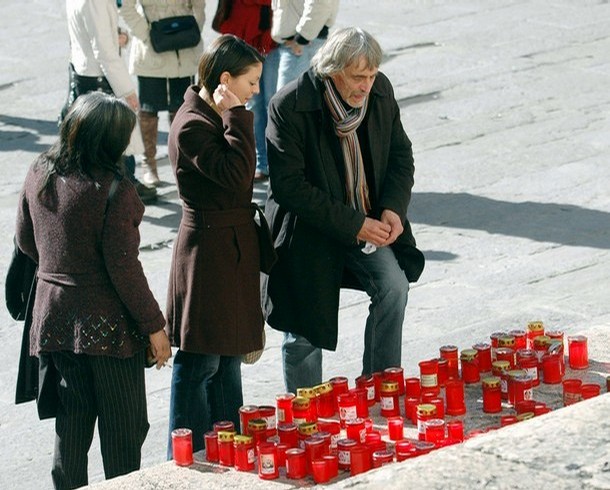
[courtesy Getty; click for for larger image]
Above, John and Arline Kercher and Stephanie in Perugia on 6 November 2007 lighting candles for Meredith.
And below, John describes in the Daily Mirror how the terrible news of her death first reached him in south London.
I am at the counter in a bank in Croydon when my mobile phone rings.
It is 2.15pm on November 1 and Meredith is calling from Perugia to see how I am. It’s an unusual time for her to ring. We usually speak most evenings, but rarely during the day.
But today she doesn’t have any classes at university, where she’s studying European Politics and Italian. It’s a public holiday. We chat for two minutes, I tell her I love her and that I’ll call her later. She says she is going out, so it will be the next day.
That will be the last time I ever speak to Meredith. The next day at 5pm I am at home when Meredith’s mother Arline calls to say she’s heard reports that a British girl student has been murdered in Perugia. Obviously, there is concern. But there are thousands of British students in Perugia and you try to use that as a calming influence.
I ring Meredith but get an automated message telling me her mobile is switched off.
For the next half hour I try at least a dozen times before it suddenly starts ringing.
Relief sets in as I believe she’s switched it back on. But still there is no answer. I keep trying for a further half hour.
By now my instincts have kicked in. I have to get information fast.
I call the foreign desk of the Daily Mirror, a paper I have worked with for many years as a freelance journalist.
They tell me they only have sketchy details of the incident but if I call back in an hour they might have more.
It’s an agonising wait, but when I call back I’m told Italian police found the girl’s phone and they have been in touch with people in London. Again, my hopes rise. This must mean that whoever this unfortunate girl is, the family and British police have been notified by now.
But then my worst fears are realised. Thirty minutes later the Mirror calls to tell me they have a name. There’s some initial reluctance from the woman on the phone to give me the information. But I shall never forget her words: “The name going around Italy is Meredith.”
I drop the phone. I don’t believe it and think there must be a mistake. But I know it’s probably true. I can’t cry. I’m numb with shock.
A friend drives me to Meredith’s mother and on the way, I phone the Foreign Office to see if they can confirm what I’d been told.
They say they don’t have full details and I shouldn’t necessarily jump to conclusions.
Within an hour our family - Meredith’s sister Stephanie and brothers John and Lyle - have gathered at the house.
We’re all distraught. By now, Arline has spoken to the Foreign Office who confirm the worst. At 9pm, Meredith’s photo comes on the news. The room falls silent. We all hug.
The next day we learn some of Meredith’s old school friends plan to lay flowers at her former school in Croydon.
We go to meet them, expecting half a dozen - but there are more than 70.
It’s unbelievably touching. Some have come from universities around the country.
A small service is held in the school gardens.
Nothing prepared us for having to fly to Italy to formally identify her body and we had no idea how much her death had touched the world.
At the morgue, journalists, Italian chief of police and many others are close to tears. Arline and Stephanie go in to see Meredith. But I can’t because it would have put a full stop to my memory of her.
I had last seen her a couple of weeks before, when she flew home to buy winter clothes. We met for a coffee and she showed me some boots she had bought.
I want that to be the one memory of my daughter I hold in my mind for ever.
It’s dreadful having to wait six weeks before we can lay Meredith to rest, while police investigate. The funeral stuns me.
I didn’t expect the more than 500 people who attend. Her friends have flown in from Canada, Europe and Japan.
Afterwards, hundreds of messages flood the internet. Many are from as far as Australia and Brazil, people who never knew her but are touched by her tragic passing and who loved her smile.
Even in death she seems to reach out to people. Arline has helped me with our fond memories of Meredith as a tot. How Meredith enjoyed many things from an early age.
She went to ballet and in her teens did karate, reaching her third belt.
At school she loved reading. She wrote poetry and stories.
She was always good company and her sense of humour always had us and others laughing. The sense of the ridiculous stayed with her. She had such life and vitality and made friends wherever she went. Meredith really enjoyed Halloween.
As a youngster she would make a costume from bin liners, put candles in the pumpkins with faces, tie them to sticks and then we would visit neighbours.
It is ironic and tragic that she would die so terribly only one day after Halloween.
As Arline puts it, Meredith leaves a void that can never be filled. But wonderful memories of her live on in our hearts. All of us who knew her know what we lost.
Meredith is not only a terrible loss to her family and friends, she is also a huge loss to the world.
Meredith’s Family Is Welcomed By Lawyer Maresca To The Court
Posted by Peter Quennell
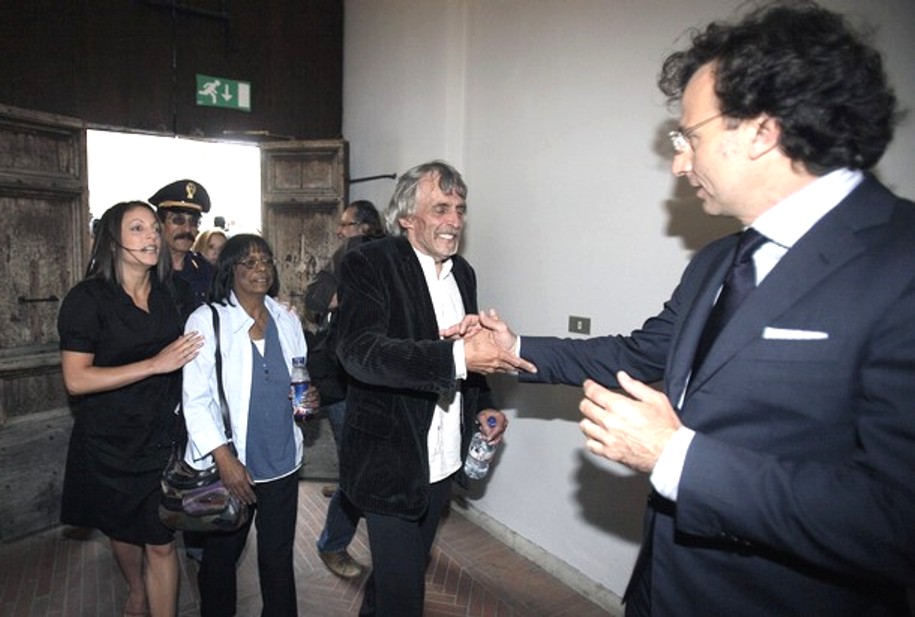
[click for larger image; courtesy Getty Images]
Father John, mother Arline, and sister Stephanie arrive for the afternoon session.
Neither of Meredith’s brothers are shown here, although we believe that one or both are also now in Perugia. They may have entered the court by way of the route for the public.
Thursday, June 04, 2009
The Kercher Family Prepares To Testify Friday PM And Saturday
Posted by Peter Quennell

[click for larger images; shots from earlier hearings courtesy of AP]
The Italian news service AGI is reporting that the Kercher family will arrive in Perugia around mid-day on Friday.
They are expected to be on the witness stand for all of Friday afternoon and possibly for all of Saturday. This will be their second face-to-face encounter with the defendants, and possibly their first encounter with a member of Amanda Knox’s family - at Rudy Guede’s trial, Knox’s parents chose to wait at a certain distance away from the courtroom.
Prior to their testimony, on Friday morning, the prosecution team will examine one final witness - Luca Lalli - on the wounds on Meredith’s body. Then the legal team for the Kerchers, Francesco Maresca and Serena Perna, will examine their first witnesses, the medical-legal expert Gianaristide Norelli and the forensic geneticist Francesca Torricelli.
In the afternoon the team will lead each member of the Kercher family who takes the stand - most probably John, Arline, and Stephanie - through their testimony, and they can then be cross-examined by the lead judge and the defense teams for Knox and Sollecito.
Their testimony will focus on their memories of Meredith, on her decision to come and study in Perugia, on any cellphone calls received or not received by her mother, Arline Kercher, from Meredith on the night in question, and on what Meredith may have related on the relationship between Meredith and Amanda Knox.
Their testimony is awaited with great interest as they have given almost no interviews in the past year and a half, and they have never made any statements about their theory of the crime or their takes on the two defendants. In contrast to the friends of Amanda Knox, they have repeatedly expressed confidence through Mr Maresca in the Italian judges, prosecutors, police teams, and justice system as a whole.
Italy seems to be treating Meredith’s family with an outstanding display of kindness and support. This post might help to explain why.
Plus they are enormously admired for their own grace, dignity and discretion. And their obvious sense of huge loss.

